Video and Photo Epic: Five Tips for Riding Ethiopia's Simien Mountains
Why Bringing a Bike to Ethiopia’s Highlands May (Or May Not) Be a Good Idea
I’ve never been to Africa before. When I was invited on a trip to Ethiopia in the winter of 2015 with a cast of varied characters, my mind was full of images I’d seen of the country on TV as a child: famine, little kids crying and wasteland. The exhausting journey from the west coast of North America to the east side of Africa gave me plenty of time to immerse my mind with uneducated and misinformed expectations, a bit of fear and images of a time Ethiopia has since forgotten. Why would anyone bring a bike to Ethiopia? There had to be a good reason for what we had committed to and we were going to find it. I didn’t have a list of things to help me prepare for my journey, so I put one together for anyone who might be thinking of trying this on their own time:
1. Hire a guide who knows a guy.
Our plan was to circumnavigate Ethiopia’s Simien Mountains by bike, hitting Ethiopia’s highest peak en route (Ras Deshen - 4550m), and we chose Tom Bodkin, owner/operator of Secret Compass to show us the way. Tom had been here before, but more importantly, he knew Getachew “Getch” Enyew. Getch and his buddy Szamon are locals in this area and knew most of the folks we ran into across our 8-day journey through Ethiopia’s backcountry. The value of a guide can’t be understated on a trip like this: Ethiopia’s first language is Amharic (not English). While Ethiopia is safe in a cultural/political sense, it is really, really difficult to navigate on your own and actually dangerous in terms of the remoteness and ruggedness of where we were spending the majority of our time.
Tom arranged for our group of seven to travel with Getch’s assembled support crew. The travel here is as rough as it gets and the locals who helped us along the way were absolute ninjas on foot. Traveling alongside them made for more than a few soul-crushing realizations about what our bike’s limitations truly were without an actual mountain bike trail to ride. We were quickly made aware of what the human body can sustain (and what it can’t) along the way.
Of everyone on this trip, each one of us was qualified us to handle almost anything that came our way. Having a guide with extensive experience in countries like Ethiopia, however, was what we needed to survive just a few of the following challenges:
- Acute gastrointestinal distress with no access to running water (and rapid transport to local communities as a result),
- Facial lacerations and required medical attention
- Financial arrangements, trip planning and negotiations between locals and National Park authorities.
![Dan Milner images from trip to Ethiopia.]()
2. Get yourself sorted before you leave.
Vaccinations: You’ll need vaccinations for Yellow Fever and a few others to be safe. I was told I couldn’t get in and out of Ethiopia without a Yellow Fever Card – it was only kind of true, because no one at any border ever asked me for it, but I am glad I had it just in case whichever country I was flying home via requested it for entry. My local doctor went over all of the vaccination considerations and $500CAD later, I was protected against a few key (nightmarish) diseases.
Gear: Refer to point 1. If your guy who knows a guy has you covered, bring the obvious basics (drink bag with a 3L bladder. Pump, tires, spares... whatever you can carry on your back without looking like a professional photographer/filmer unless you are one). Don’t expect to find many replacement parts in Ethiopia. Seriously, a broken handlebar or taco’d rear wheel here could spell the end of your trip. And don’t plan on filtering water from streams/ponds as you travel – I can’t recall seeing more than one body of water I would have been willing to filter and subsequently drink out of, so this can be a huge part of how you manage yourself and your group.
Drugs: Ethiopian airports are full of signs that graphically illustrate the symptoms of the Ebola virus. They’re especially careful to keep people entering the country informed of the symptoms because Ethiopia is Ebola free and they’d really like to keep it that way. This means that your temperature is checked at the gate of every incoming/outgoing domestic and international flight – so you’d best do what you can to avoid a fever if you plan on flying home! Having a small medicine cabinet of your favorite over-the-counters is key out here. Keep in mind that the local cuisine can wreak havoc on a delicate first-world gut – the consequence of running it loose with what you eat here is real...and (potentially) disgusting.
![Ethiopian hospital]()
3. Hang out with the kids.
I don’t know the actual statistics of the ratio of kids to adults in Ethiopia, but I can comfortably state that there are many, many children roaming the expansive terrain of the Simien Mountains. Their faces would light up as we passed through their villages and the sheer volume of rad little humans engaging us with smiles and persistent requests for “Bic? Bic?” (pens - they ask for them so much that I began to suspect that they weren’t truly demanding these in lieu of money, it was just how they knew they’d be able to connect with us) became pretty overwhelming over the course of 8 days.
The kids are beautiful - heartbreakingly so – and they’re so happy. My first-world ego whispered to me that they needed to be rescued to the comforts of drywall homes and data plans, but the reality is that they’re stoked to be alive, they were stoked to see us (we were freaks on bikes in the middle of the Ethiopian Highlands) and they were way faster than us out there.
4. Bring a good pair of shoes...
...Because you’re gonna spend a healthy amount of time on foot. I came to this trip all prepped with chamois cream (I’d never used it before but, I figured I'd need it here?) and fixes for my Reverb should something tragic happen to it along the way, but in the end, I didn’t do a ton of saddle time. None of us did.
On the first few days, we were treated to climbs of about 1000m beginning at 3500m or so; there was definitely a bit of time spent grinding away on our bikes on roads and in tussock grasses. I liked riding up the roads, chasing down Aaron Gulley (from Santa Fe and certainly at an advantage over those of us who live at sea level), Dain Zaffke and Kamil Tartarkovic. We all figured that the time we put in during those early days of our expedition would be earning us massive, epic descents...but it didn’t. While we did have moments of ripping singletrack glory scattered between baboons, mulemen and bright-eyed children, our time was heavily outweighed with long hours of bikes on our backs ascending and descending the gnarly terrain locals use as thoroughfares between remote villages.
5. Prepare to dig deep and learn a lot about yourself.
I did not, for one second, expect to find my trip to Ethiopia an easy one. In fact, I can say that I had really overblown expectations about the famine and poverty I expected to see and experience. Despite the approachability of people in this region of the world and the fact that none of us died without cell reception, permanent buildings, walls around toilets and the usual comforts of home, this was the most difficult thing I have done with my bike to date. The elevation of the area coupled with the demoralizing reality of on-our-bikes-and-off-again type of travel and the lack of clean, running water taught me a level of psychological coping that I couldn’t have imagined before. We started off strong and were worn down to near shells of ourselves by the end of it all.
The Simien National Park is recognized by UNESCO as a World Heritage site but is still densely populated by people who live off of its scarce, protected land. We were never alone, and while we entered some really dark places in our minds and bodies on the bigger days of our journey, there wasn’t a lot of quiet time to totally lose it or come unglued – even when each of us hit points when we almost needed to. There were eyes on us always and there were days when it felt as if being alone again was a permanent impossibility.
What was the benefit of burning through 5-hour hike-a-bikes in 35 degree Celsius heat day in and day out?
- Perspective – my base understanding for anything difficult has been permanently altered.
- Good jokes with great people, good jokes with people who don’t even speak the same language.
- A glimpse into a beautiful, peaceful culture of people who opened their doors to us with massive smiles, amazing dance moves and the physical prowess you’d expect from a superhuman marathoner.
- A trip we will never, ever forget.
![Images by Dan Milner from Giro s trip to Ethiopia.]()
![Images by Dan Milner from Giro s trip to Ethiopia.]()
Would we do it again?
- Maybe.
Sarah Leishman ( @SarahLeishman ) is a member of the Juliana-SRAM pro team and balances her time between training and racing with writing and working a real job. She lives in Whistler, BC.
Check out Dan Milner's whole album from Ethiopia here.
MENTIONS: @GiroSportDesign / @DanMilner / @SarahLeishman / #ethiopiaepic
 | There are three things in life you cannot change: when you were born, the environment you were born in, and the talents you were born with. - Getachew Enyew |
I’ve never been to Africa before. When I was invited on a trip to Ethiopia in the winter of 2015 with a cast of varied characters, my mind was full of images I’d seen of the country on TV as a child: famine, little kids crying and wasteland. The exhausting journey from the west coast of North America to the east side of Africa gave me plenty of time to immerse my mind with uneducated and misinformed expectations, a bit of fear and images of a time Ethiopia has since forgotten. Why would anyone bring a bike to Ethiopia? There had to be a good reason for what we had committed to and we were going to find it. I didn’t have a list of things to help me prepare for my journey, so I put one together for anyone who might be thinking of trying this on their own time:
1. Hire a guide who knows a guy.
Our plan was to circumnavigate Ethiopia’s Simien Mountains by bike, hitting Ethiopia’s highest peak en route (Ras Deshen - 4550m), and we chose Tom Bodkin, owner/operator of Secret Compass to show us the way. Tom had been here before, but more importantly, he knew Getachew “Getch” Enyew. Getch and his buddy Szamon are locals in this area and knew most of the folks we ran into across our 8-day journey through Ethiopia’s backcountry. The value of a guide can’t be understated on a trip like this: Ethiopia’s first language is Amharic (not English). While Ethiopia is safe in a cultural/political sense, it is really, really difficult to navigate on your own and actually dangerous in terms of the remoteness and ruggedness of where we were spending the majority of our time.
Tom arranged for our group of seven to travel with Getch’s assembled support crew. The travel here is as rough as it gets and the locals who helped us along the way were absolute ninjas on foot. Traveling alongside them made for more than a few soul-crushing realizations about what our bike’s limitations truly were without an actual mountain bike trail to ride. We were quickly made aware of what the human body can sustain (and what it can’t) along the way.
Of everyone on this trip, each one of us was qualified us to handle almost anything that came our way. Having a guide with extensive experience in countries like Ethiopia, however, was what we needed to survive just a few of the following challenges:
- Acute gastrointestinal distress with no access to running water (and rapid transport to local communities as a result),
- Facial lacerations and required medical attention
- Financial arrangements, trip planning and negotiations between locals and National Park authorities.
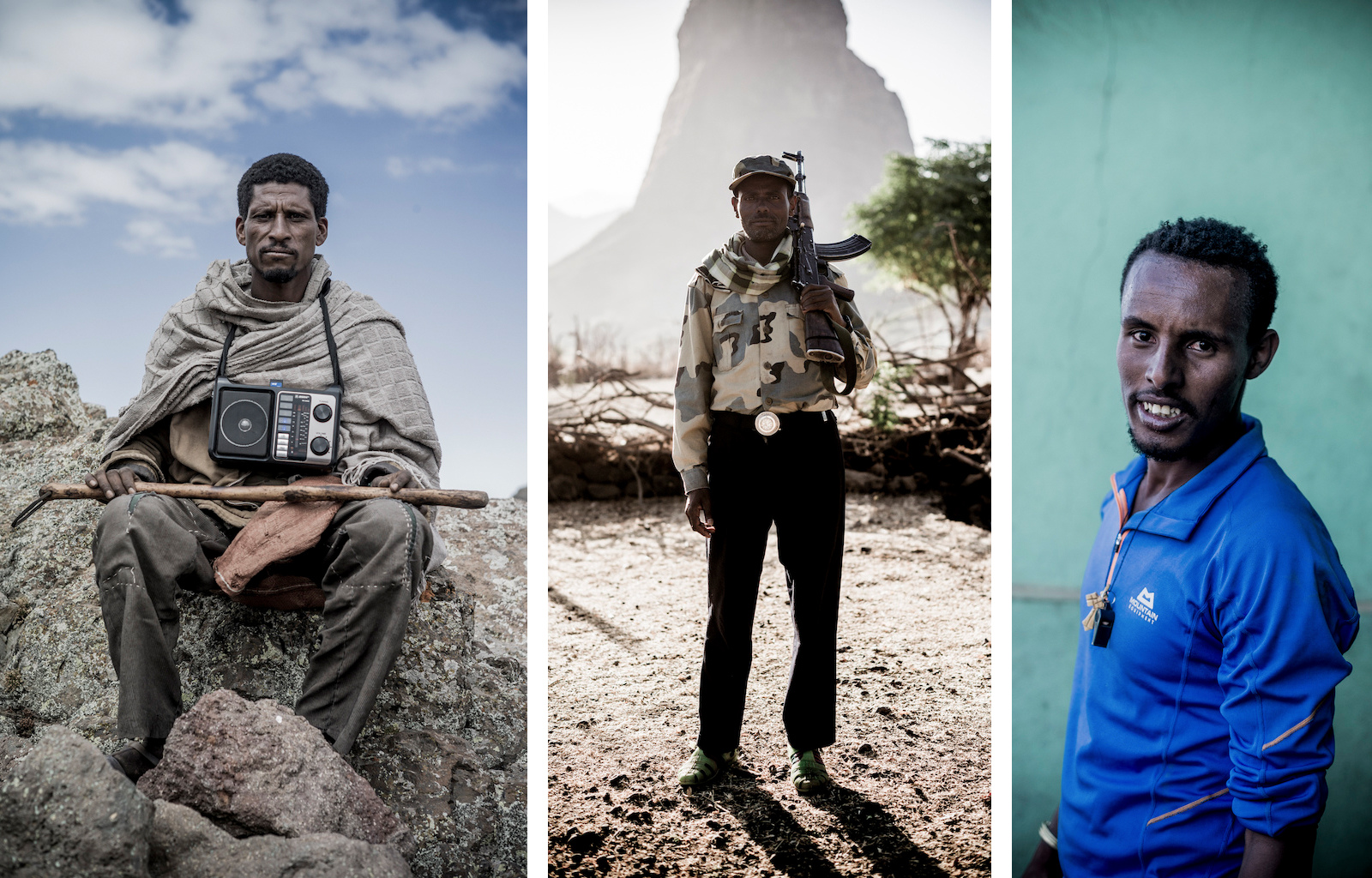
(Left) Dareje Adera - we met him on a mountain pass at nearly 4000 meters. (Center) Molla - national Park scout. (Right) Getch - the guide. Getch had all of the qualities you look for in a guide: a great sense of humor, strong fitness and patience with our group!
2. Get yourself sorted before you leave.
Vaccinations: You’ll need vaccinations for Yellow Fever and a few others to be safe. I was told I couldn’t get in and out of Ethiopia without a Yellow Fever Card – it was only kind of true, because no one at any border ever asked me for it, but I am glad I had it just in case whichever country I was flying home via requested it for entry. My local doctor went over all of the vaccination considerations and $500CAD later, I was protected against a few key (nightmarish) diseases.
Gear: Refer to point 1. If your guy who knows a guy has you covered, bring the obvious basics (drink bag with a 3L bladder. Pump, tires, spares... whatever you can carry on your back without looking like a professional photographer/filmer unless you are one). Don’t expect to find many replacement parts in Ethiopia. Seriously, a broken handlebar or taco’d rear wheel here could spell the end of your trip. And don’t plan on filtering water from streams/ponds as you travel – I can’t recall seeing more than one body of water I would have been willing to filter and subsequently drink out of, so this can be a huge part of how you manage yourself and your group.
Drugs: Ethiopian airports are full of signs that graphically illustrate the symptoms of the Ebola virus. They’re especially careful to keep people entering the country informed of the symptoms because Ethiopia is Ebola free and they’d really like to keep it that way. This means that your temperature is checked at the gate of every incoming/outgoing domestic and international flight – so you’d best do what you can to avoid a fever if you plan on flying home! Having a small medicine cabinet of your favorite over-the-counters is key out here. Keep in mind that the local cuisine can wreak havoc on a delicate first-world gut – the consequence of running it loose with what you eat here is real...and (potentially) disgusting.
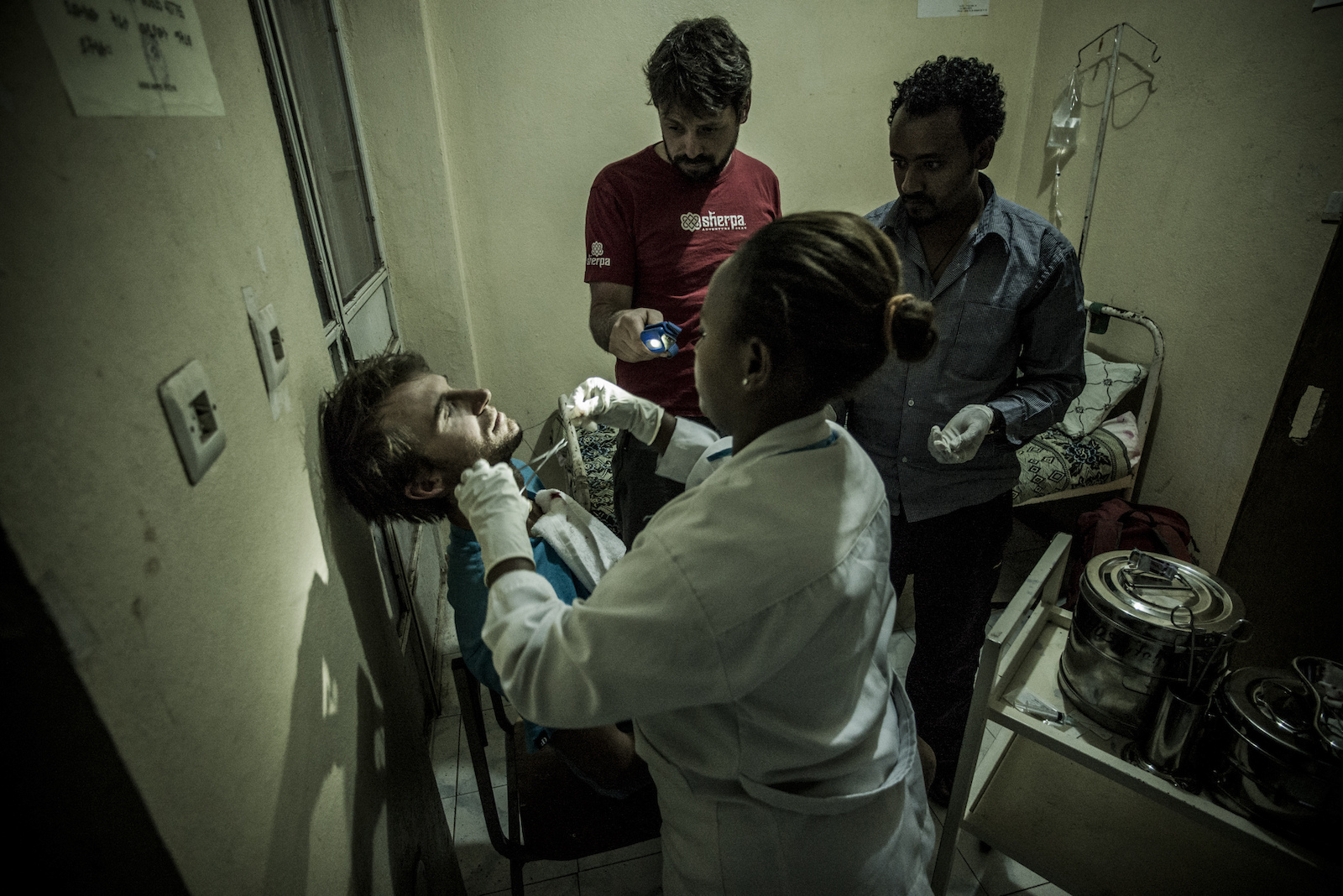
Dain Zaffke getting stitches in Gondar. Tom Bodkin is lighting the surgery with his camp flashlight. The sutures were course and fibrous (like yarn), but did the job!
3. Hang out with the kids.
I don’t know the actual statistics of the ratio of kids to adults in Ethiopia, but I can comfortably state that there are many, many children roaming the expansive terrain of the Simien Mountains. Their faces would light up as we passed through their villages and the sheer volume of rad little humans engaging us with smiles and persistent requests for “Bic? Bic?” (pens - they ask for them so much that I began to suspect that they weren’t truly demanding these in lieu of money, it was just how they knew they’d be able to connect with us) became pretty overwhelming over the course of 8 days.
The kids are beautiful - heartbreakingly so – and they’re so happy. My first-world ego whispered to me that they needed to be rescued to the comforts of drywall homes and data plans, but the reality is that they’re stoked to be alive, they were stoked to see us (we were freaks on bikes in the middle of the Ethiopian Highlands) and they were way faster than us out there.
4. Bring a good pair of shoes...
...Because you’re gonna spend a healthy amount of time on foot. I came to this trip all prepped with chamois cream (I’d never used it before but, I figured I'd need it here?) and fixes for my Reverb should something tragic happen to it along the way, but in the end, I didn’t do a ton of saddle time. None of us did.
On the first few days, we were treated to climbs of about 1000m beginning at 3500m or so; there was definitely a bit of time spent grinding away on our bikes on roads and in tussock grasses. I liked riding up the roads, chasing down Aaron Gulley (from Santa Fe and certainly at an advantage over those of us who live at sea level), Dain Zaffke and Kamil Tartarkovic. We all figured that the time we put in during those early days of our expedition would be earning us massive, epic descents...but it didn’t. While we did have moments of ripping singletrack glory scattered between baboons, mulemen and bright-eyed children, our time was heavily outweighed with long hours of bikes on our backs ascending and descending the gnarly terrain locals use as thoroughfares between remote villages.
5. Prepare to dig deep and learn a lot about yourself.
I did not, for one second, expect to find my trip to Ethiopia an easy one. In fact, I can say that I had really overblown expectations about the famine and poverty I expected to see and experience. Despite the approachability of people in this region of the world and the fact that none of us died without cell reception, permanent buildings, walls around toilets and the usual comforts of home, this was the most difficult thing I have done with my bike to date. The elevation of the area coupled with the demoralizing reality of on-our-bikes-and-off-again type of travel and the lack of clean, running water taught me a level of psychological coping that I couldn’t have imagined before. We started off strong and were worn down to near shells of ourselves by the end of it all.
The Simien National Park is recognized by UNESCO as a World Heritage site but is still densely populated by people who live off of its scarce, protected land. We were never alone, and while we entered some really dark places in our minds and bodies on the bigger days of our journey, there wasn’t a lot of quiet time to totally lose it or come unglued – even when each of us hit points when we almost needed to. There were eyes on us always and there were days when it felt as if being alone again was a permanent impossibility.
What was the benefit of burning through 5-hour hike-a-bikes in 35 degree Celsius heat day in and day out?
- Perspective – my base understanding for anything difficult has been permanently altered.
- Good jokes with great people, good jokes with people who don’t even speak the same language.
- A glimpse into a beautiful, peaceful culture of people who opened their doors to us with massive smiles, amazing dance moves and the physical prowess you’d expect from a superhuman marathoner.
- A trip we will never, ever forget.
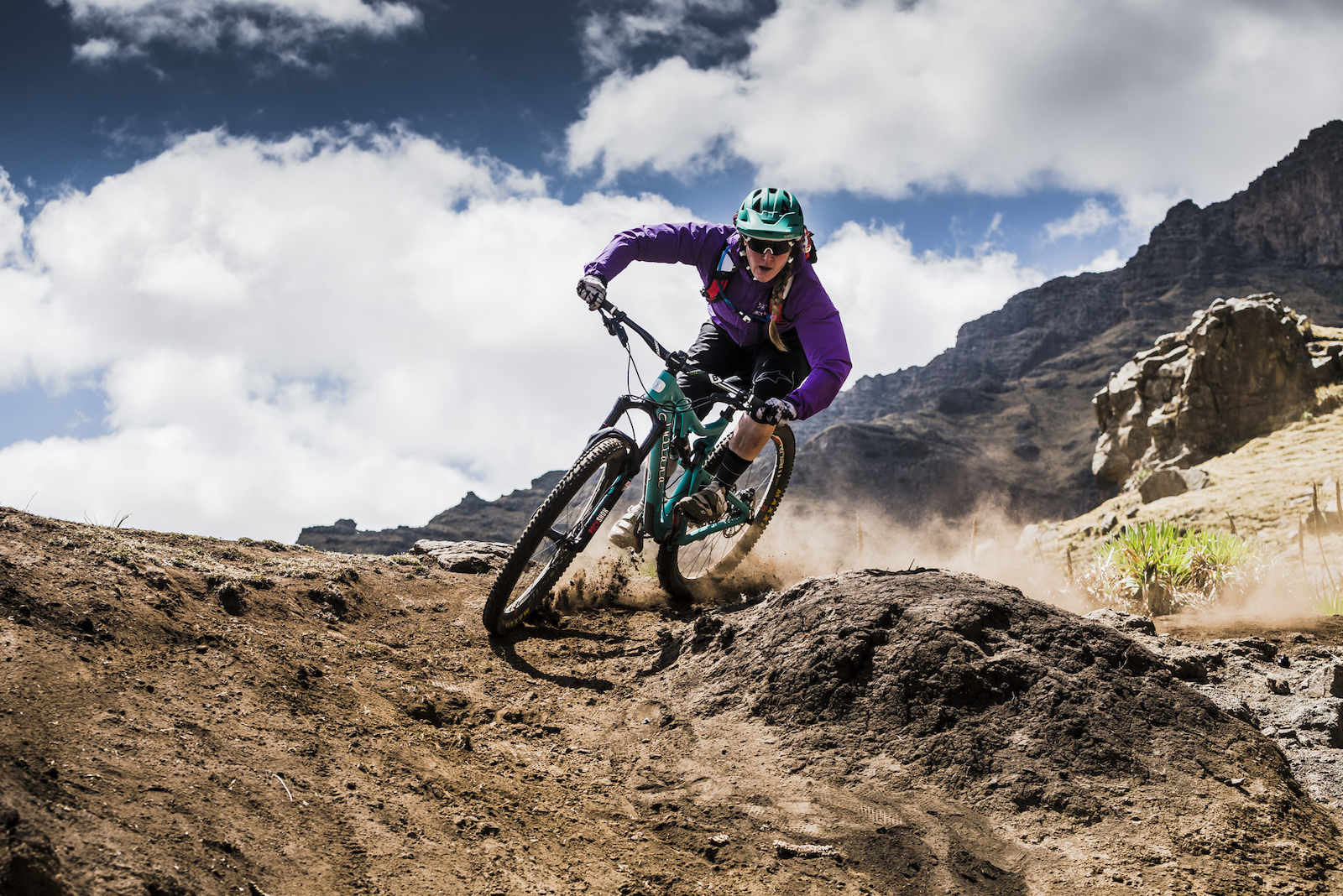
Sarah Leishman getting accustomed to the arid soil and high elevation. Oddly, the higher we traveled into the Simiens, the better the conditions.
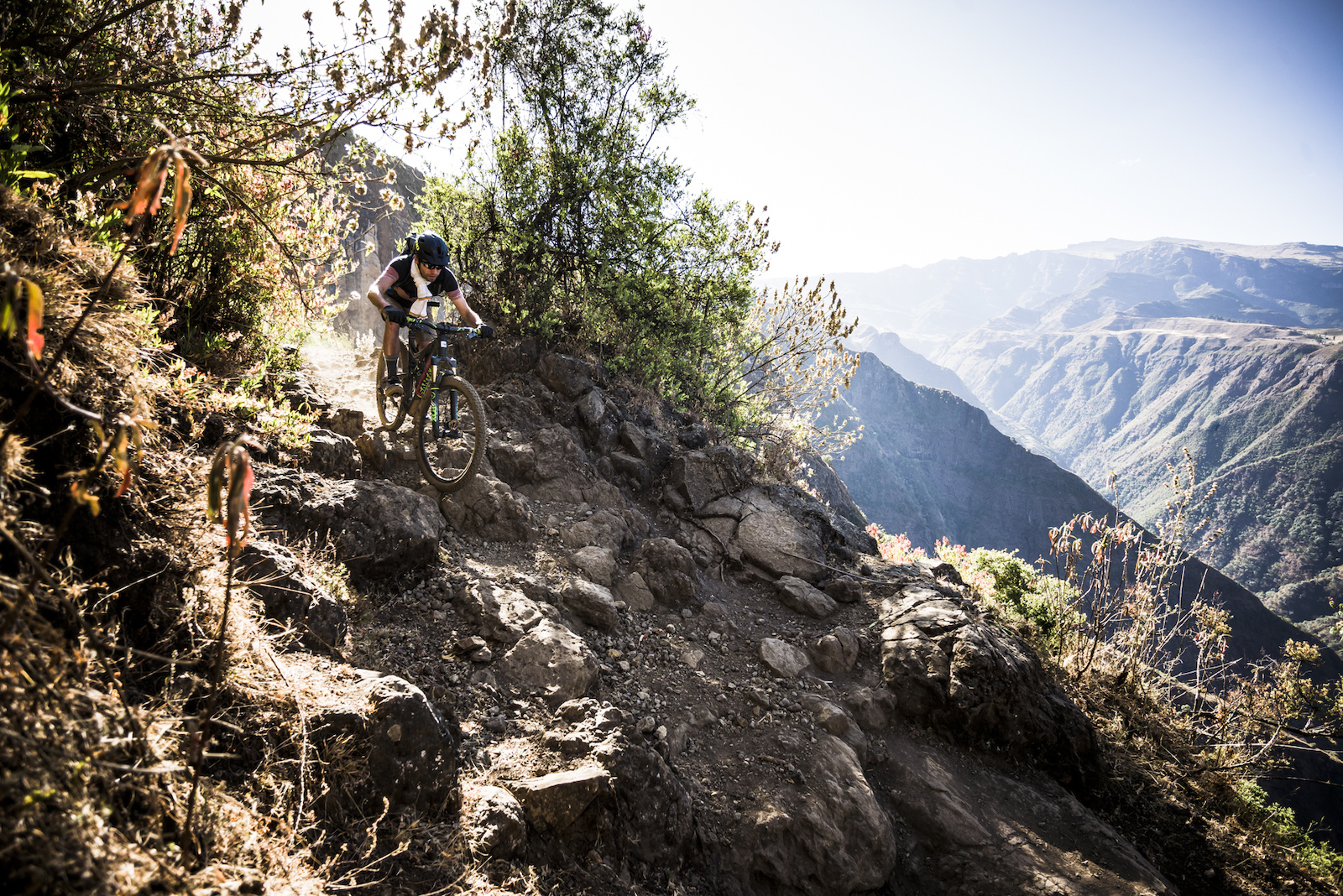
Dain Zaffke - and, yes, that's a scarf. Our guides awarded us these scarves when we summited Ras Dashen. They offered more protection than sunblock and as a bonus, they featured Ethiopia's colors (aka Rasta colors).
Would we do it again?
- Maybe.
Sarah Leishman ( @SarahLeishman ) is a member of the Juliana-SRAM pro team and balances her time between training and racing with writing and working a real job. She lives in Whistler, BC.
Check out Dan Milner's whole album from Ethiopia here.
MENTIONS: @GiroSportDesign / @DanMilner / @SarahLeishman / #ethiopiaepic
Author Info:
Must Read This Week
Sign Up for the Pinkbike Newsletter - All the Biggest, Most Interesting Stories in your Inbox
PB Newsletter Signup

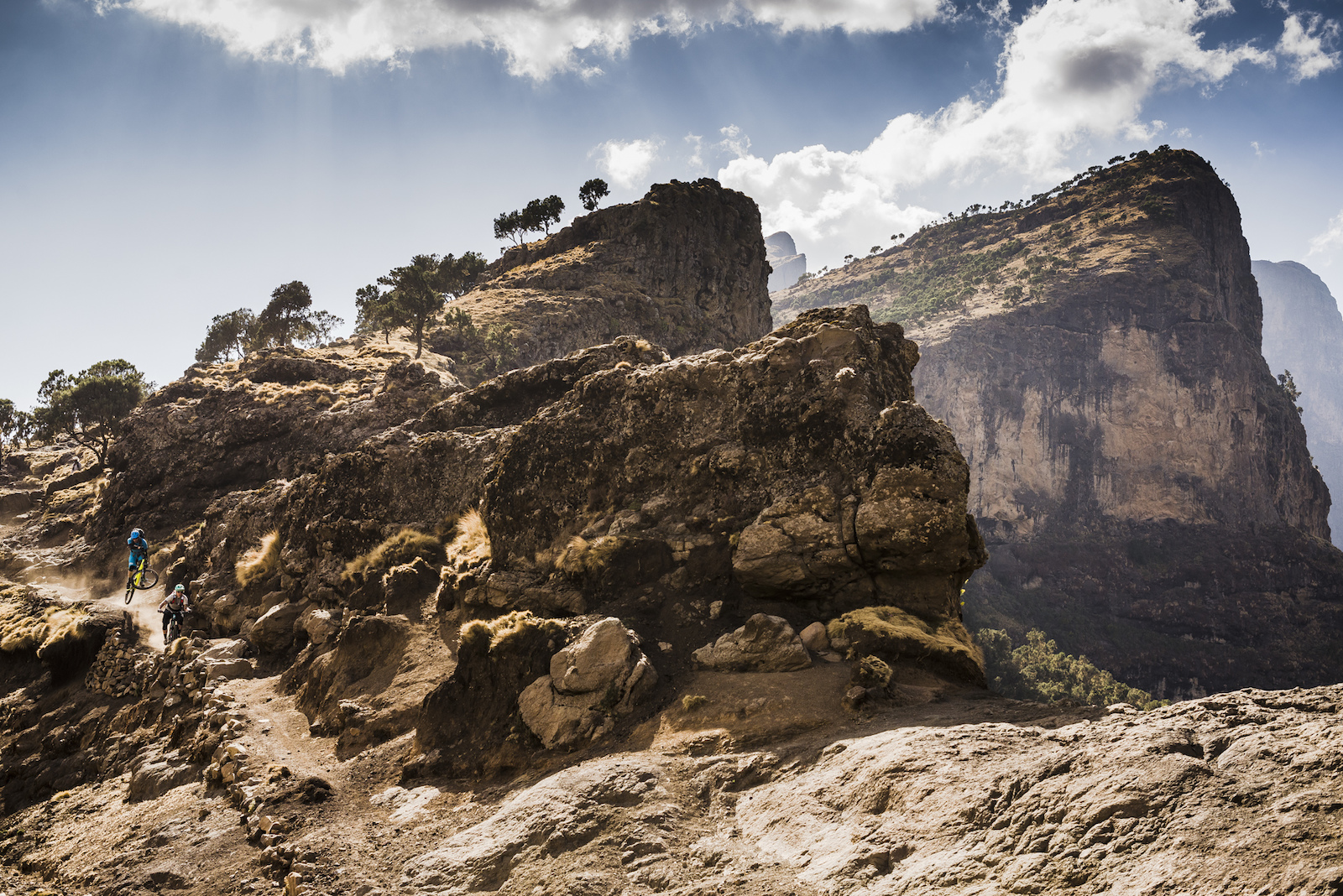
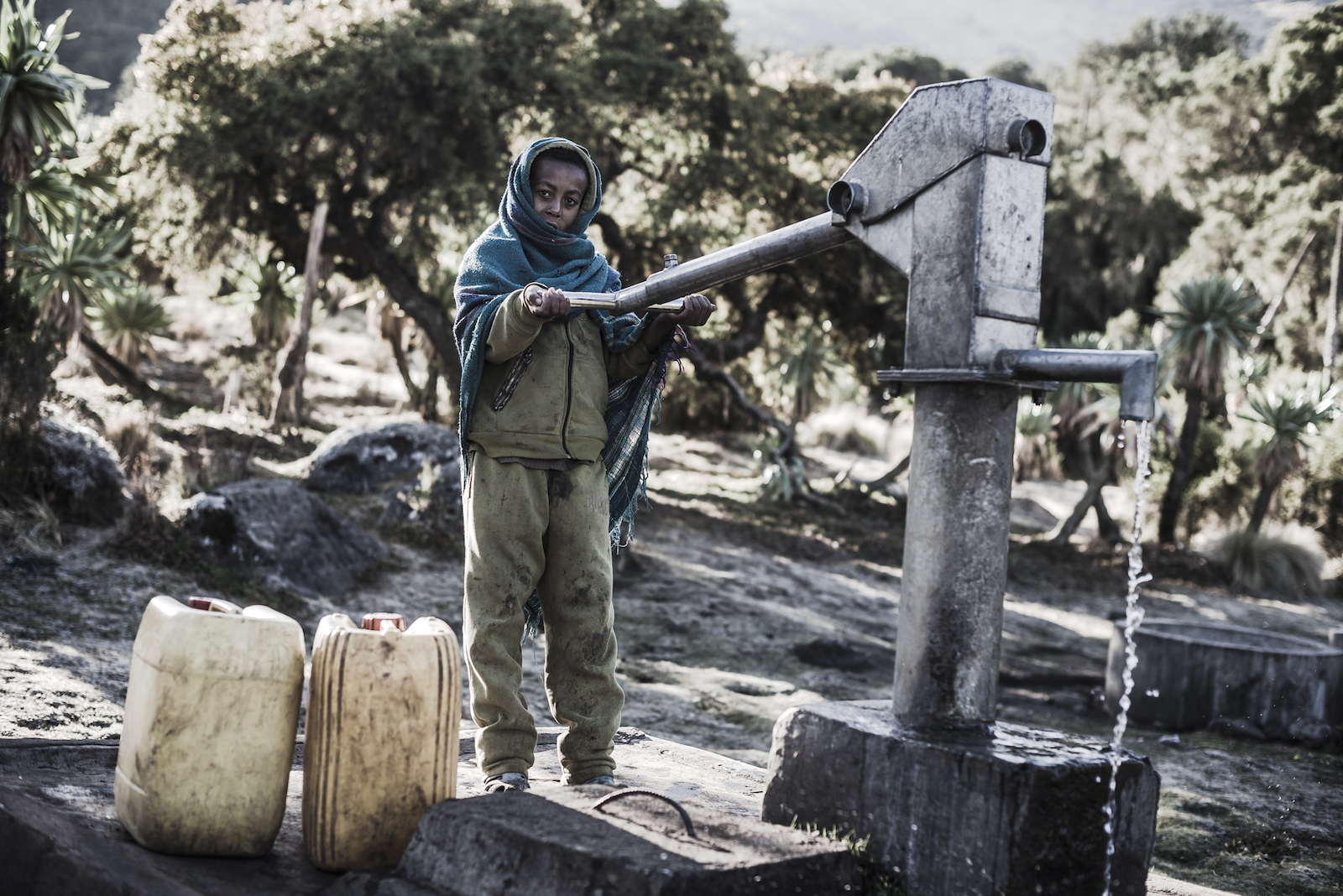
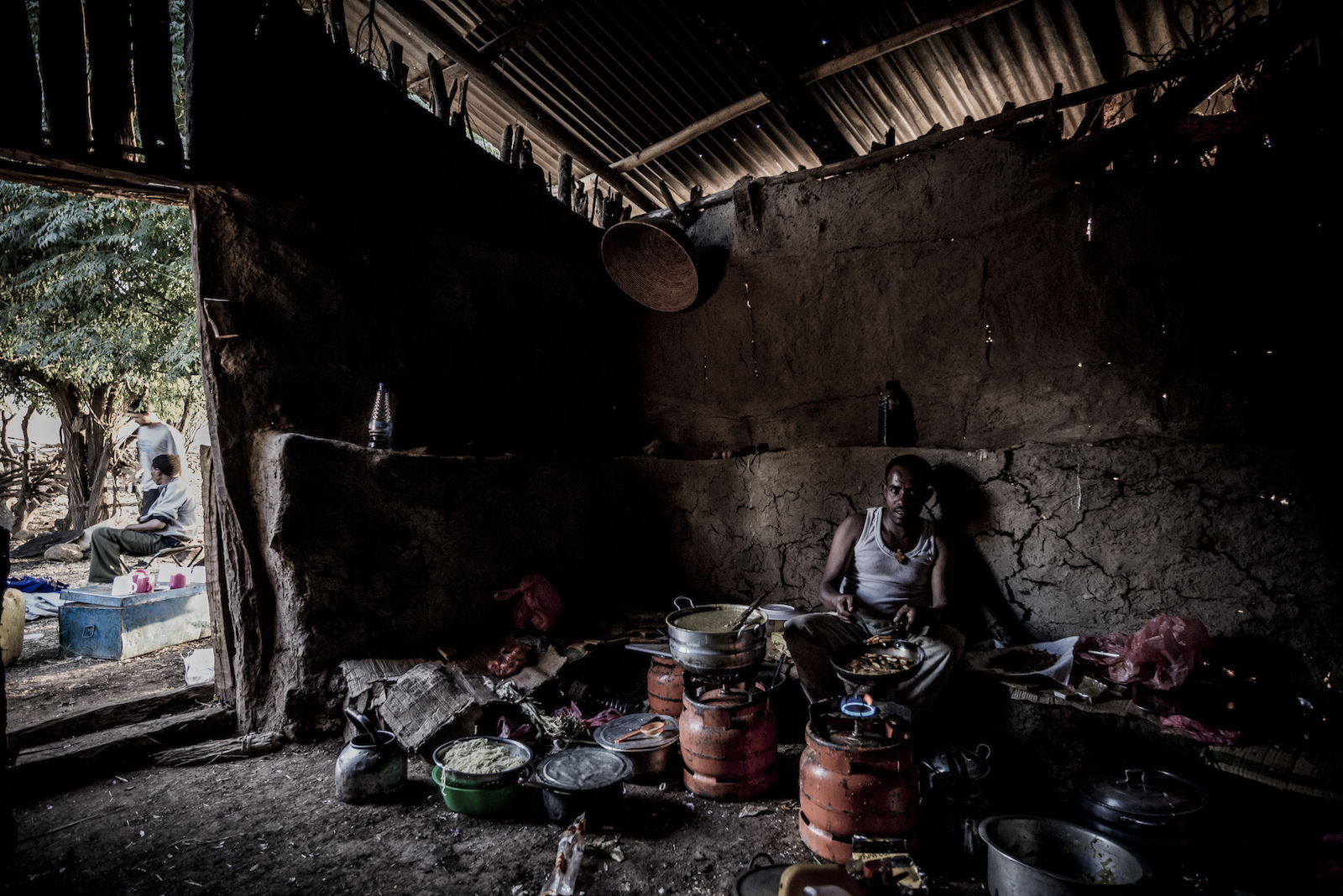
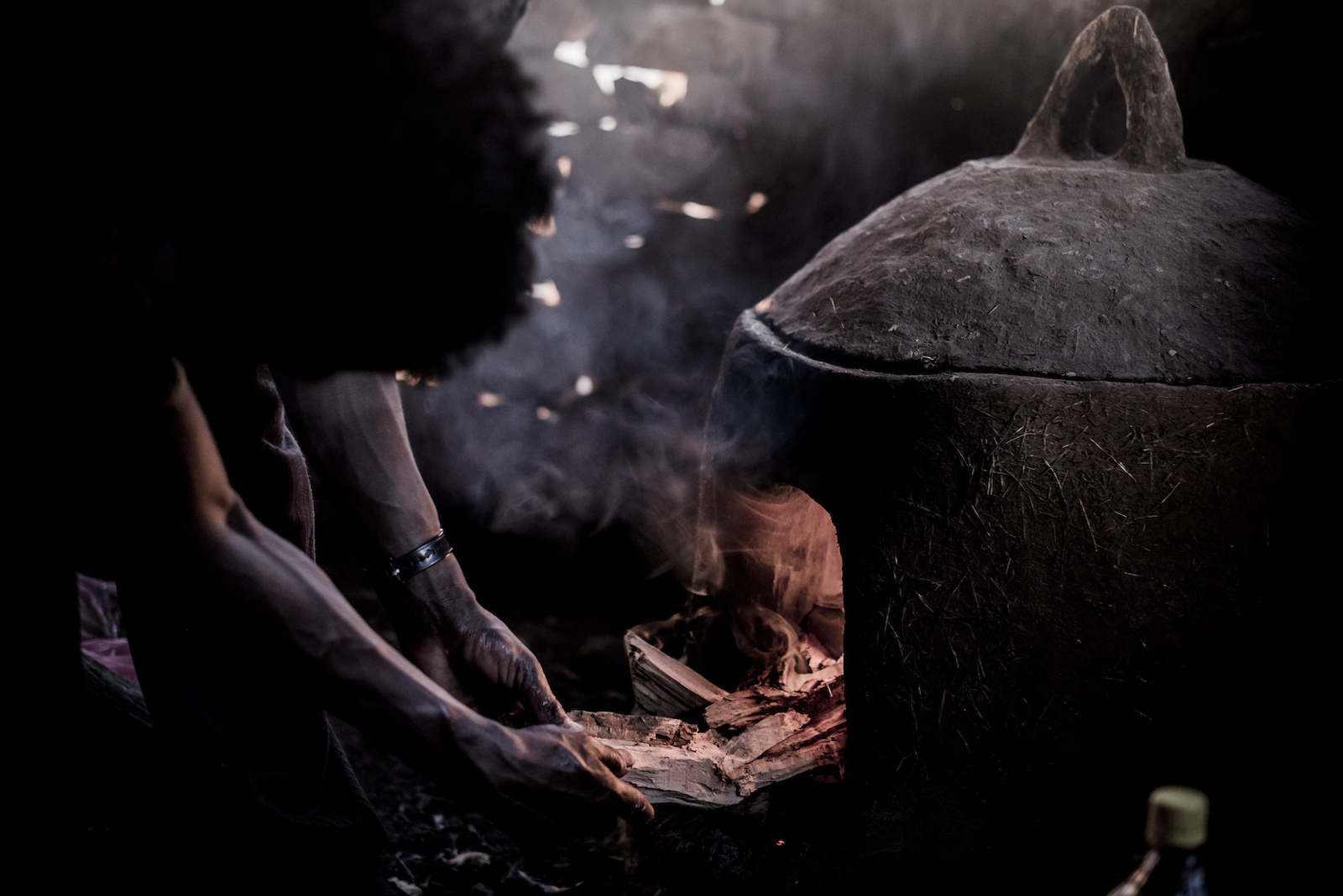
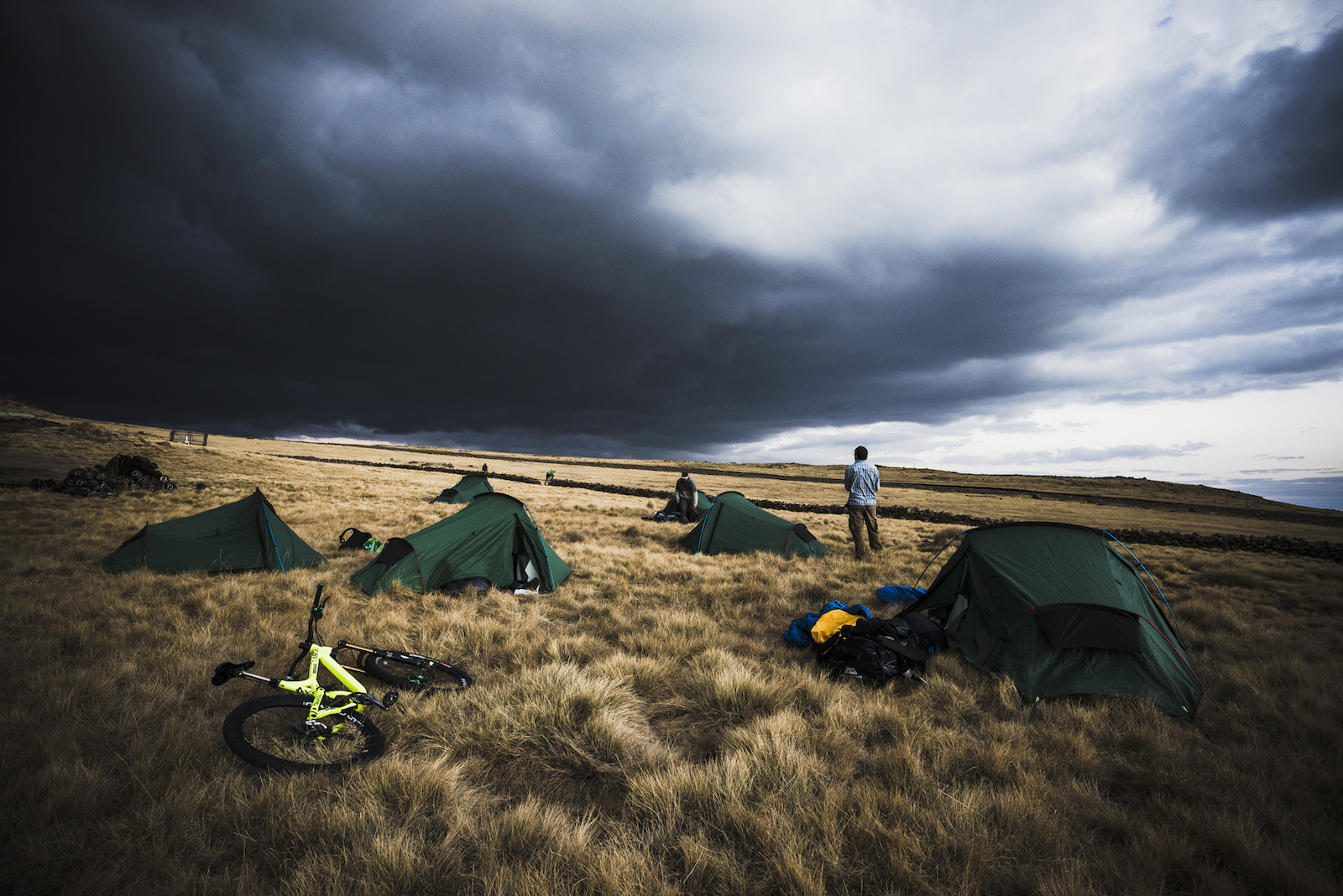
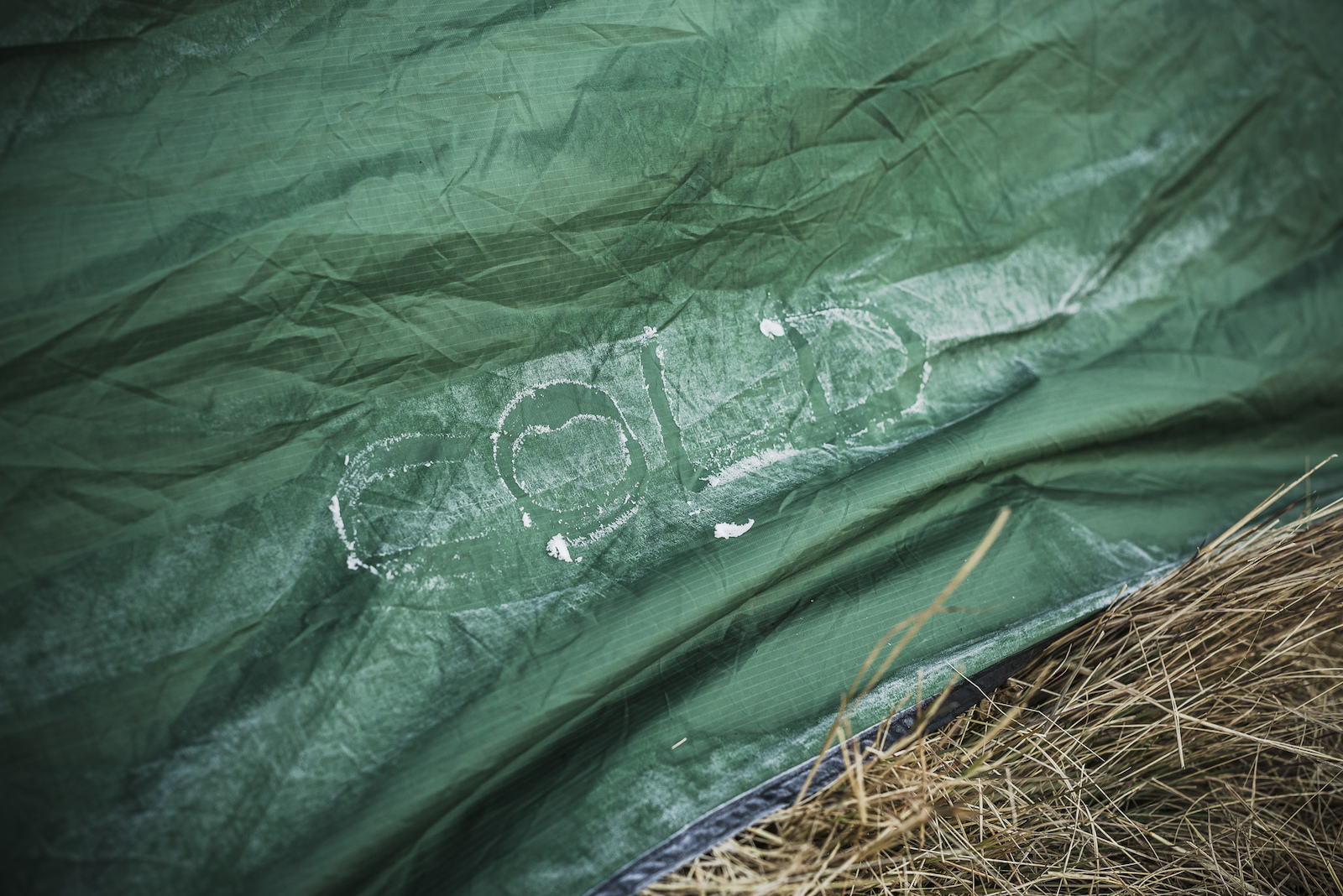
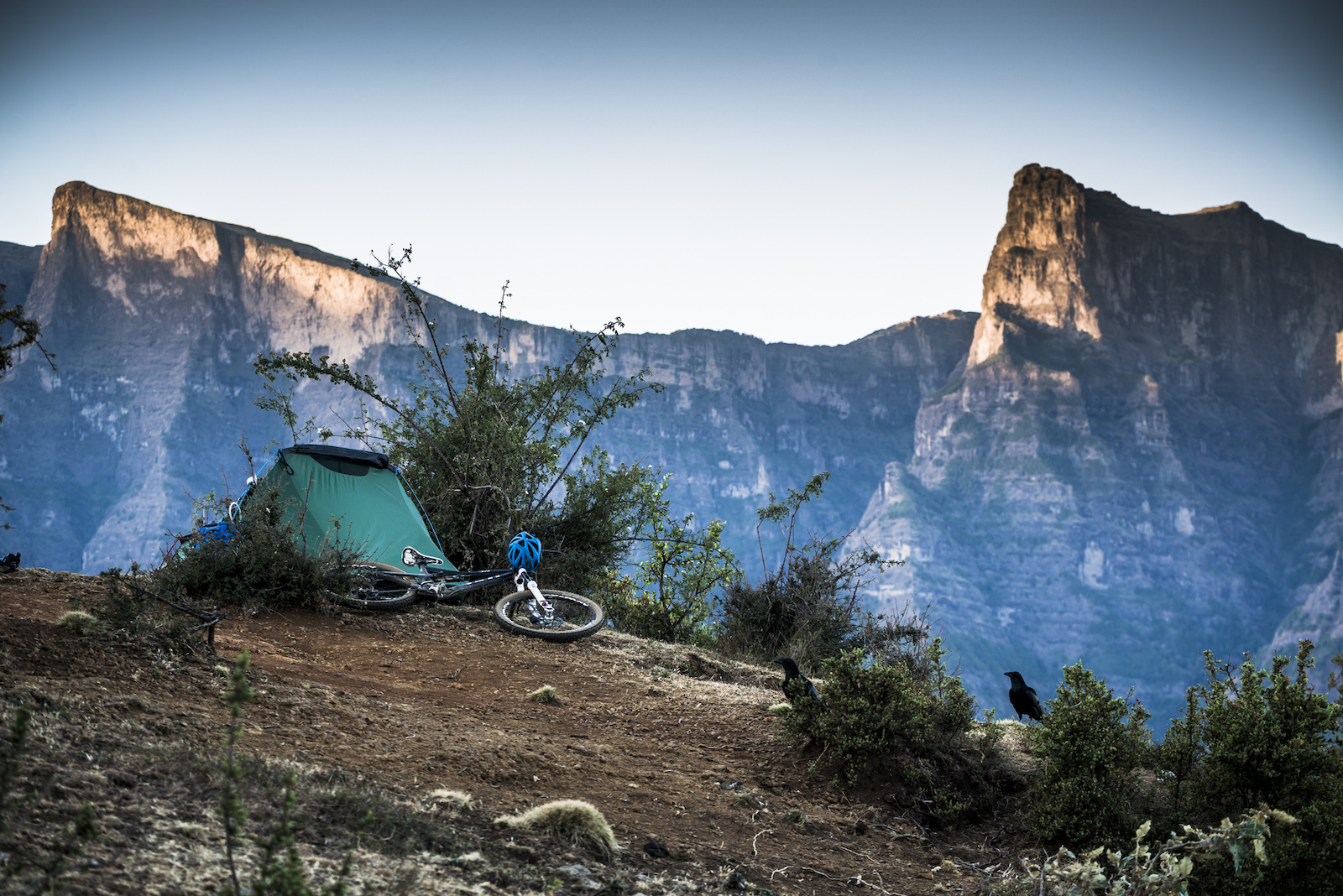
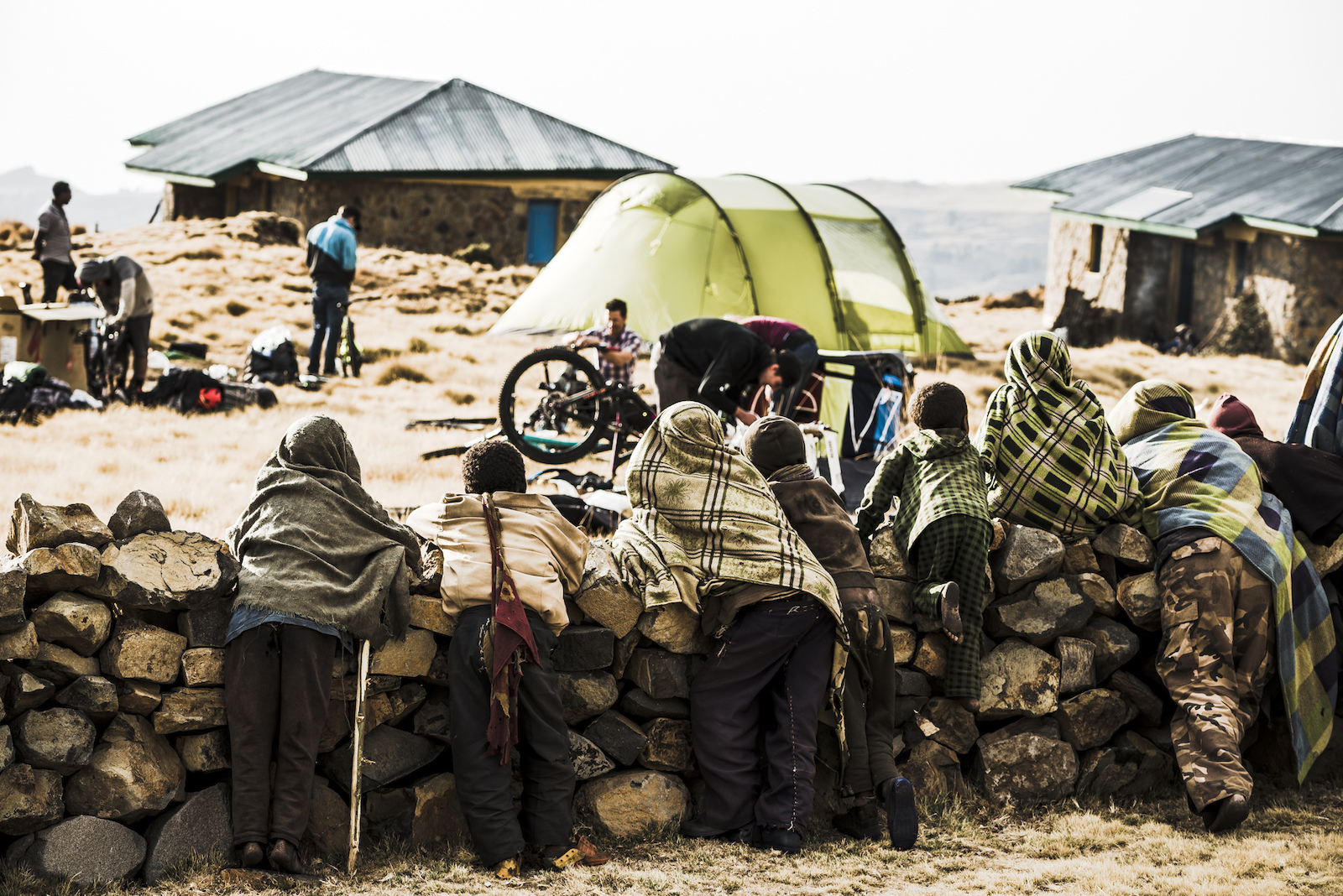
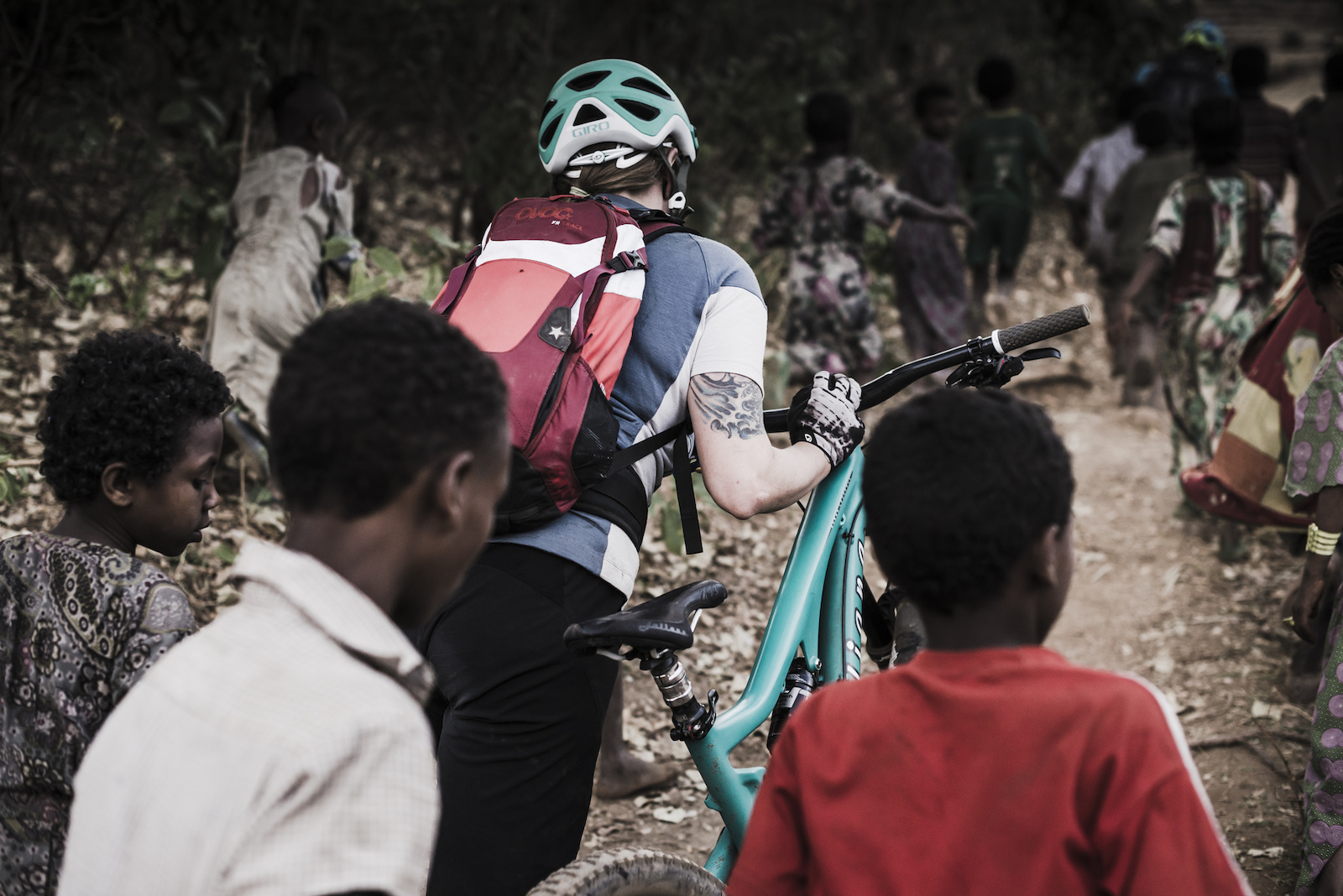
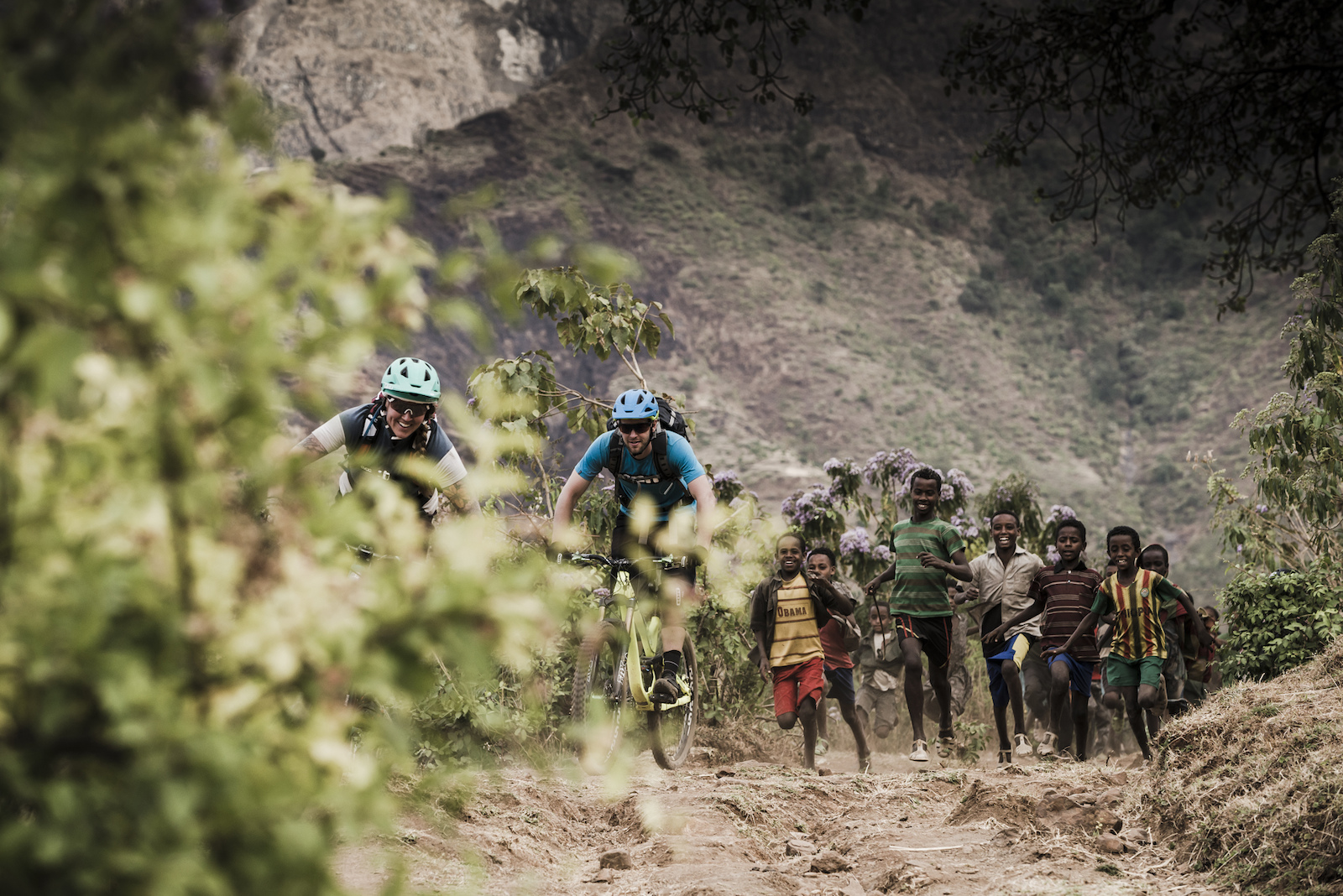
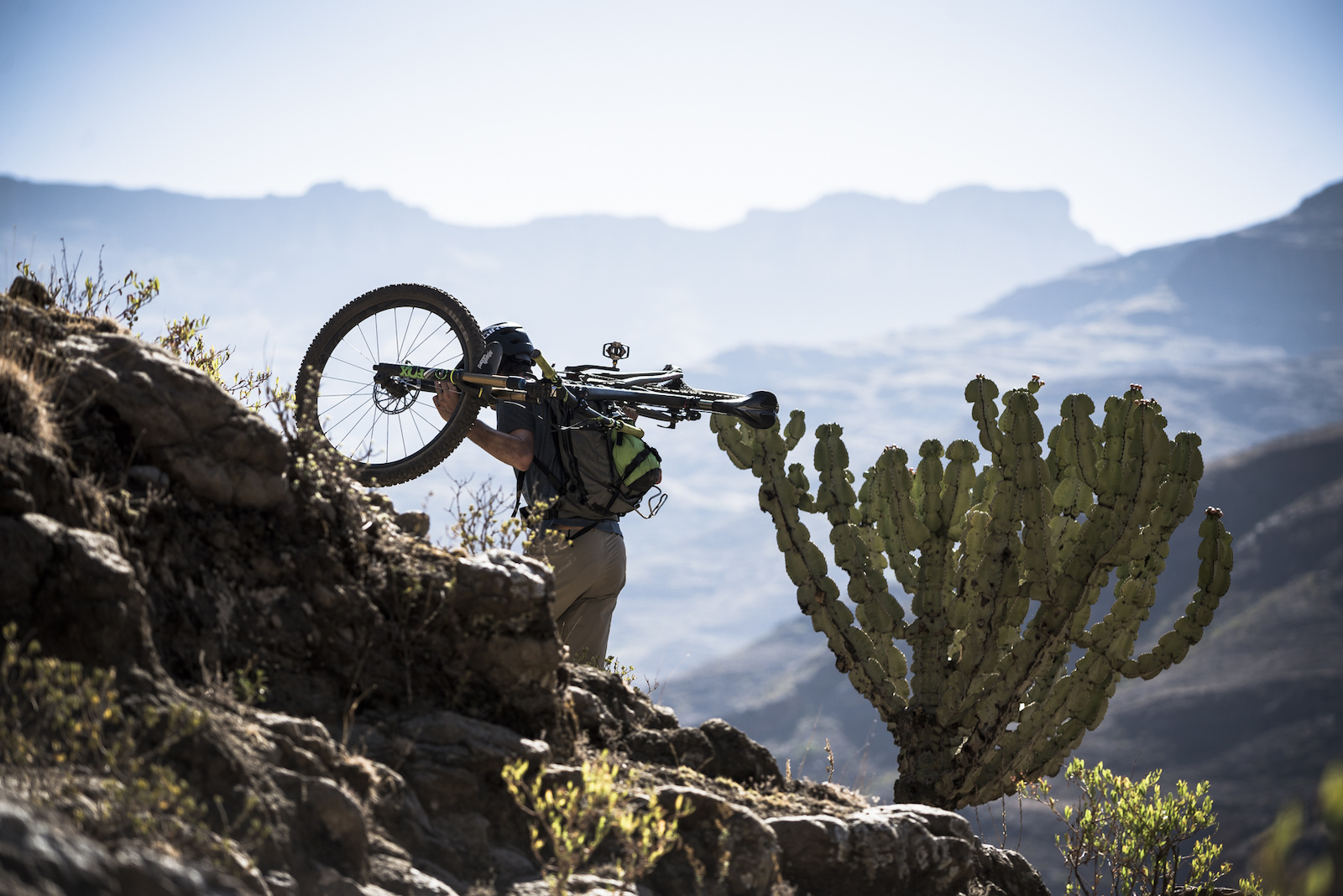
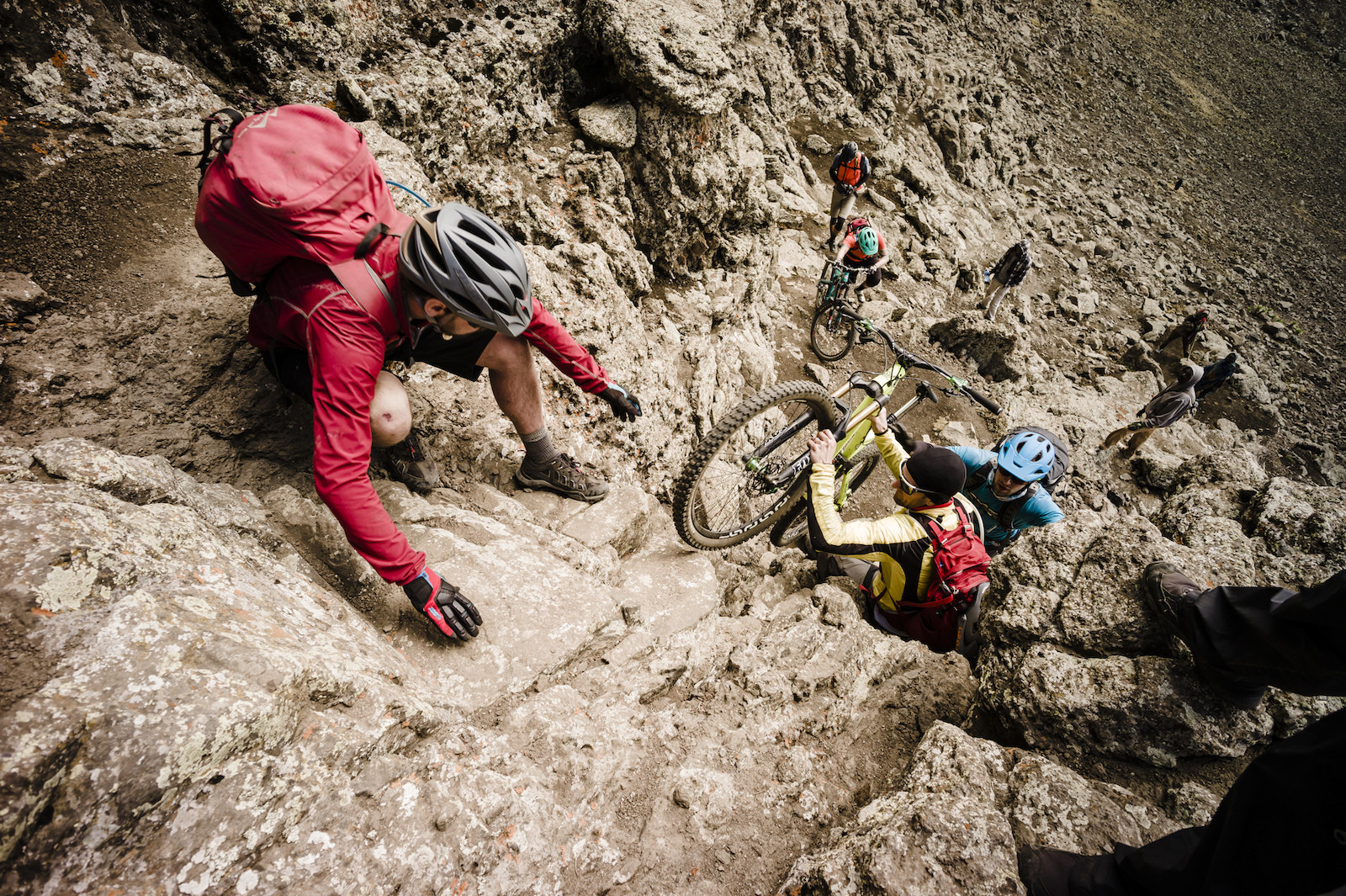
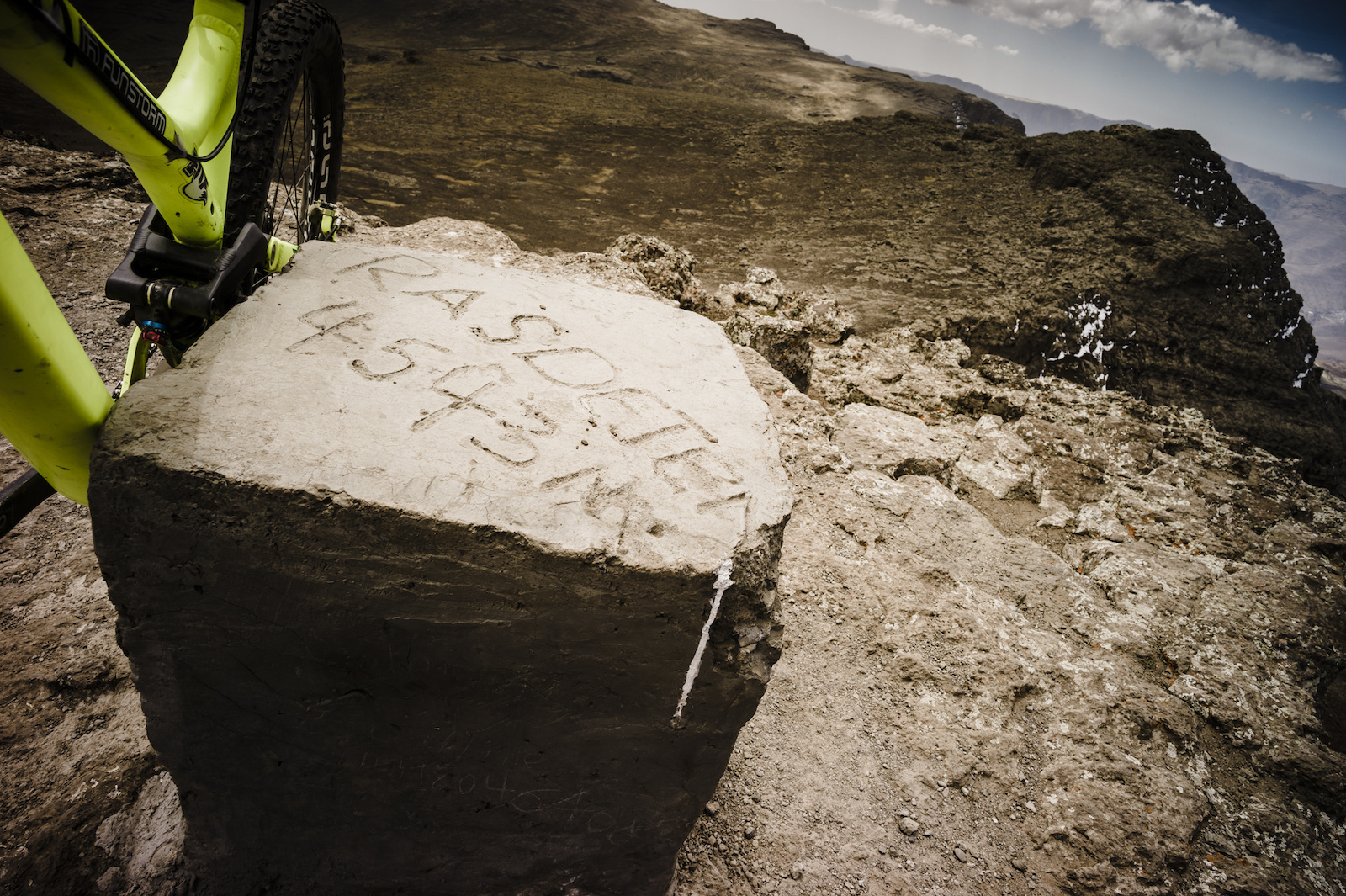
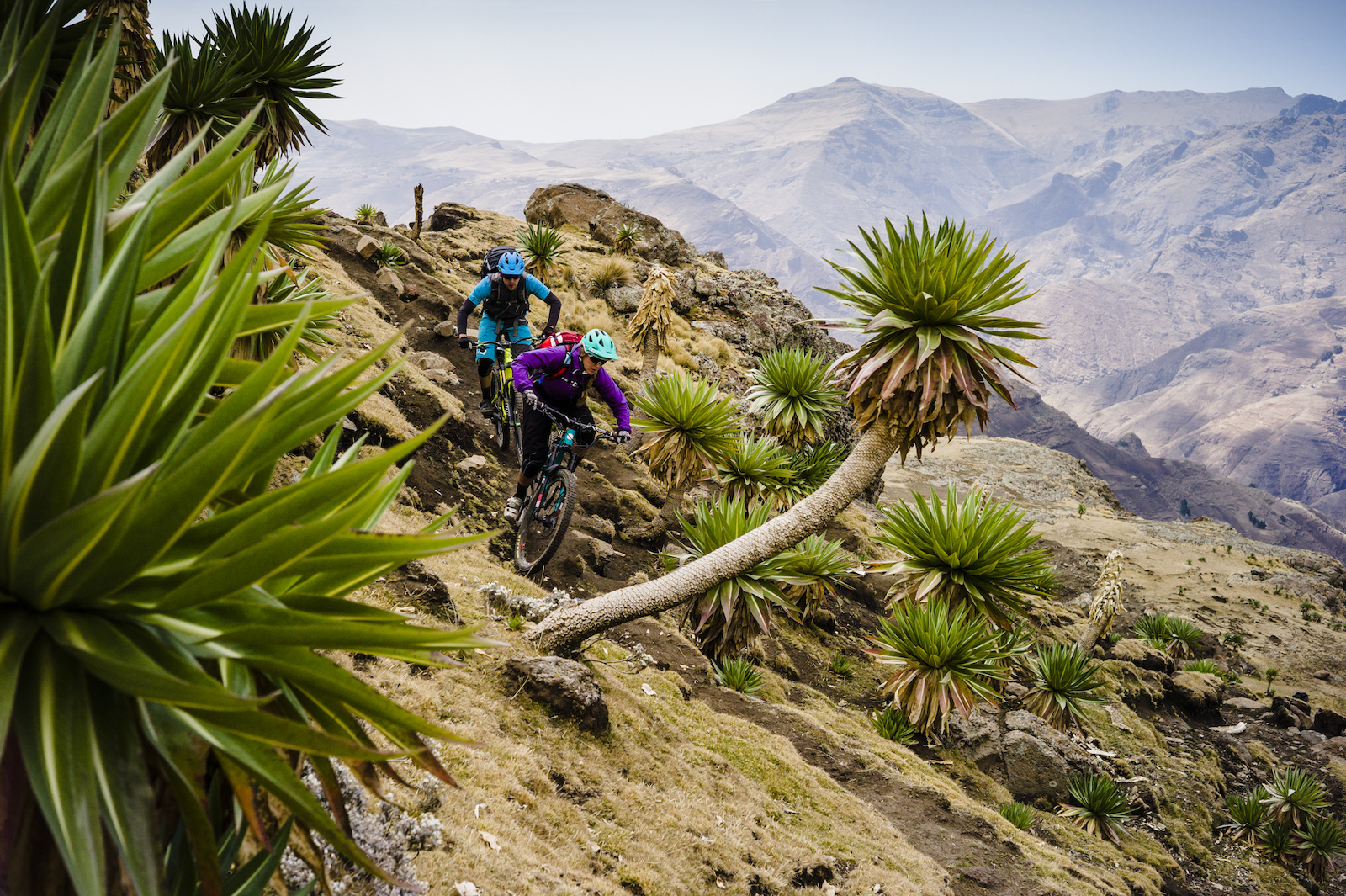
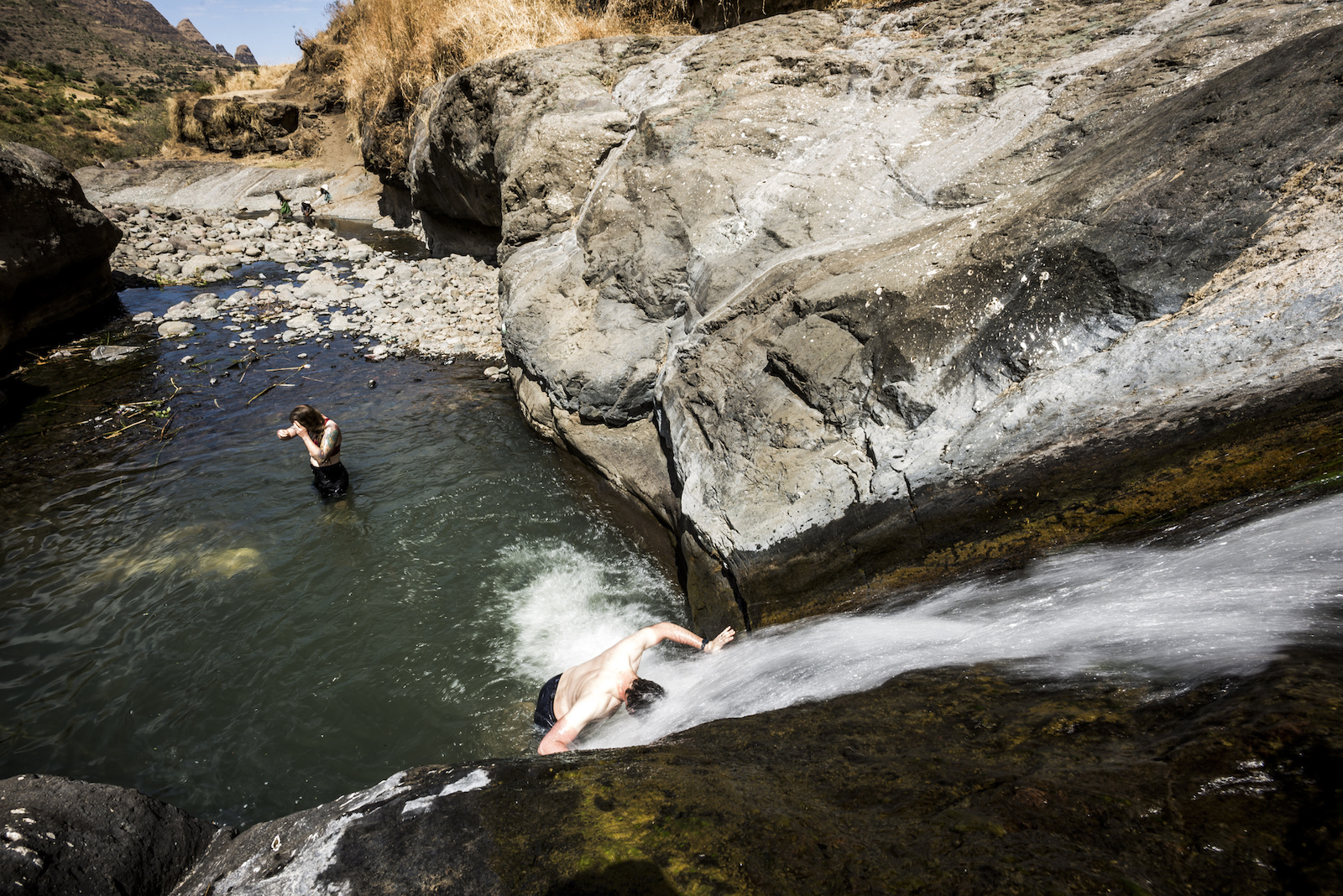
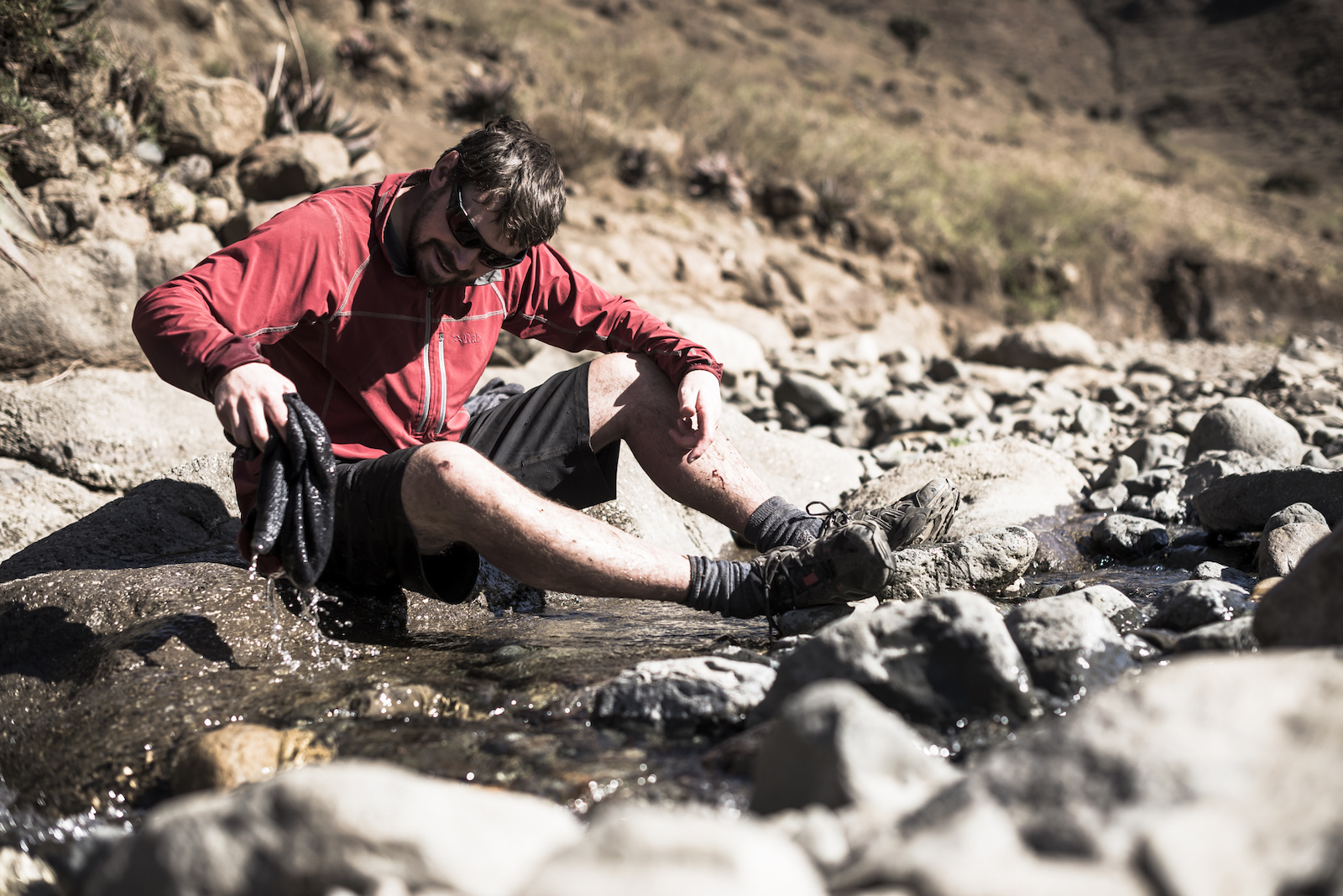
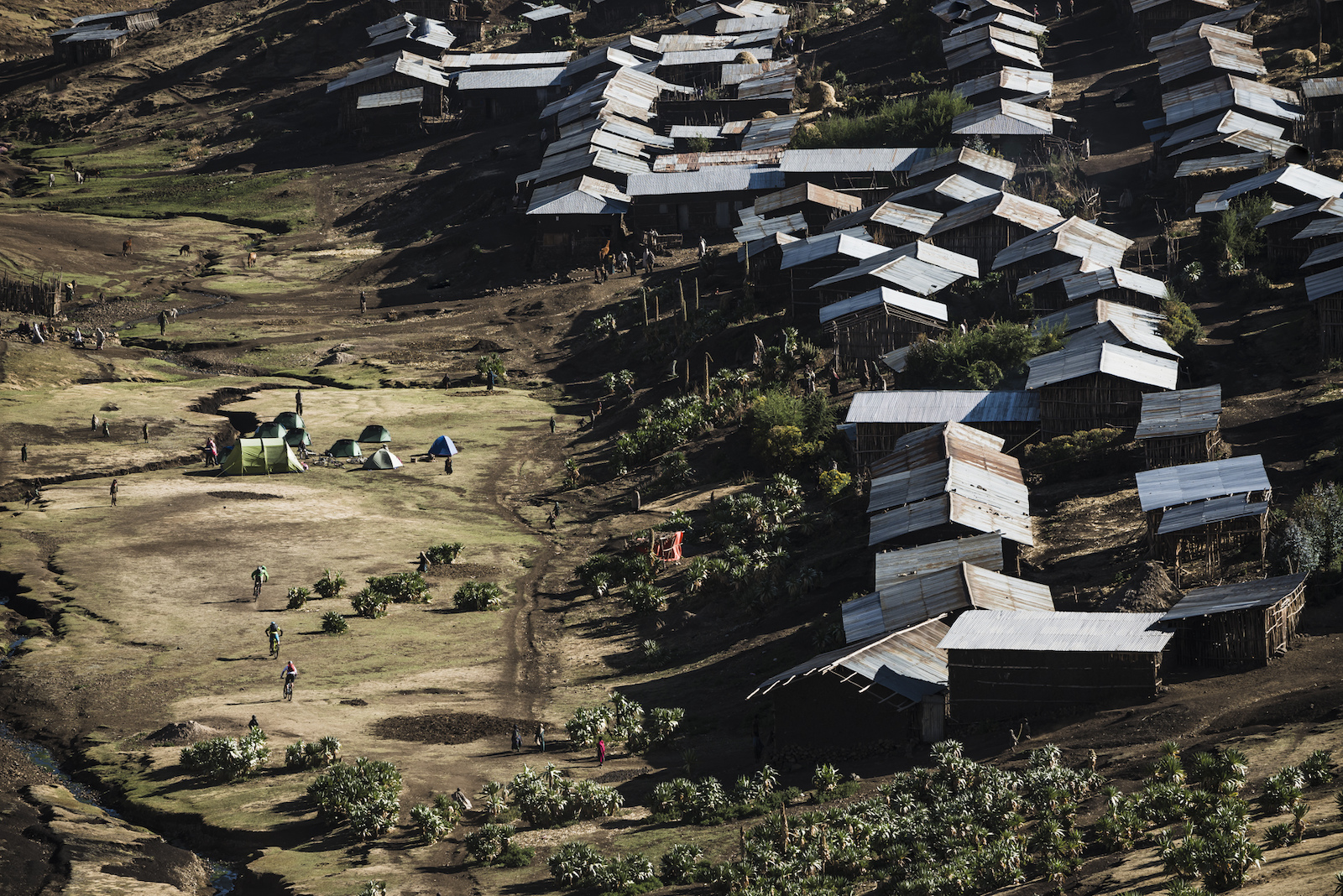
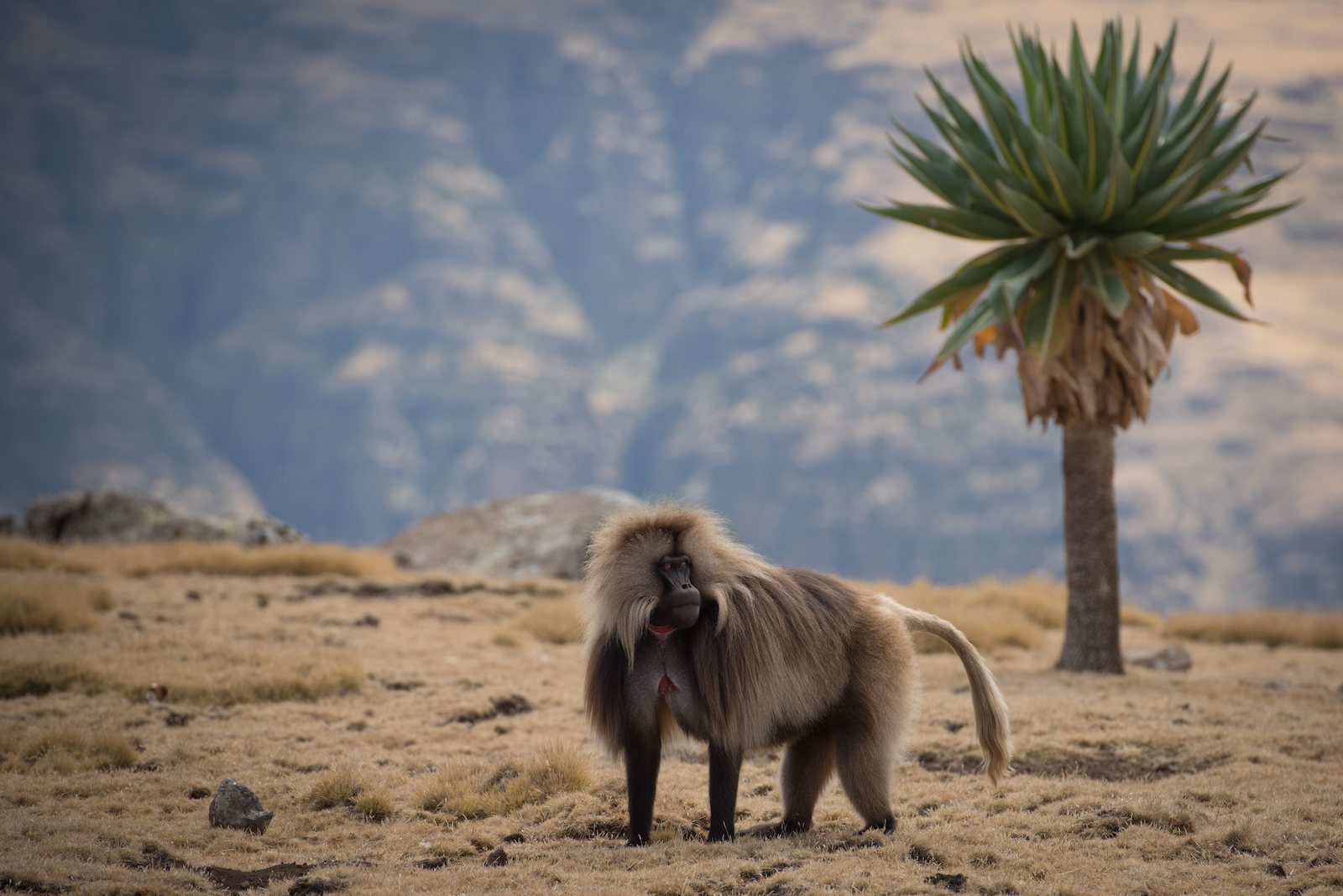
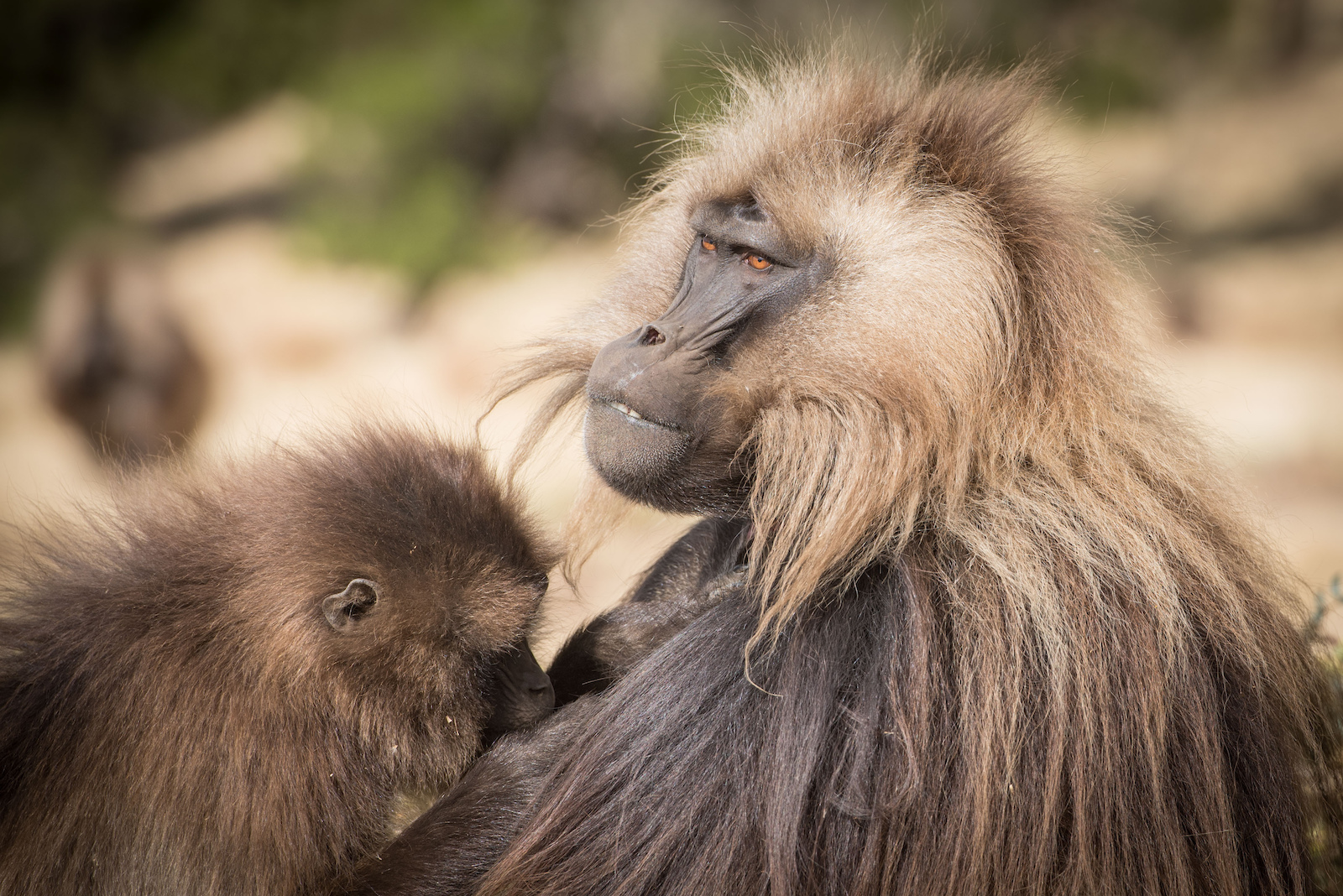
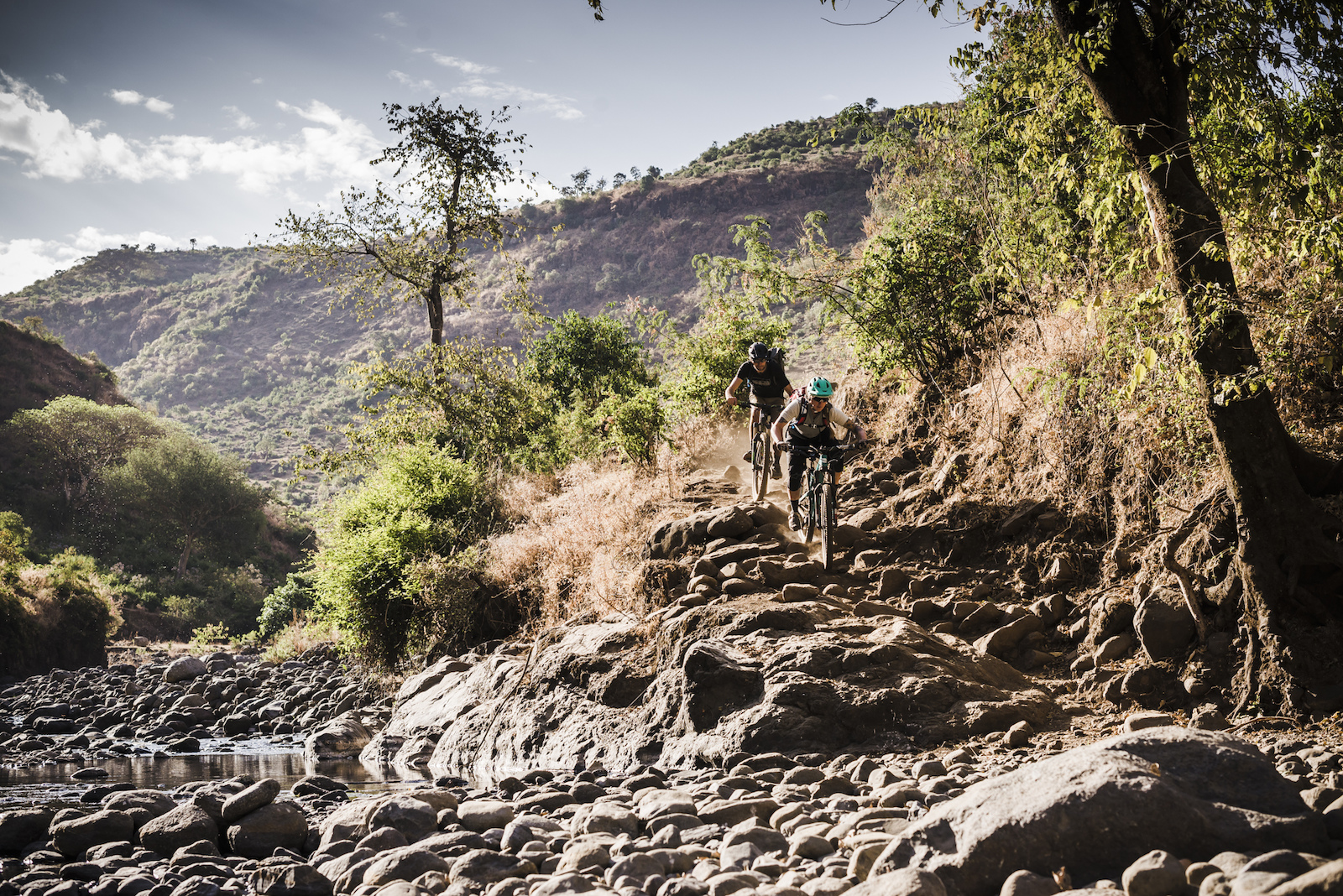
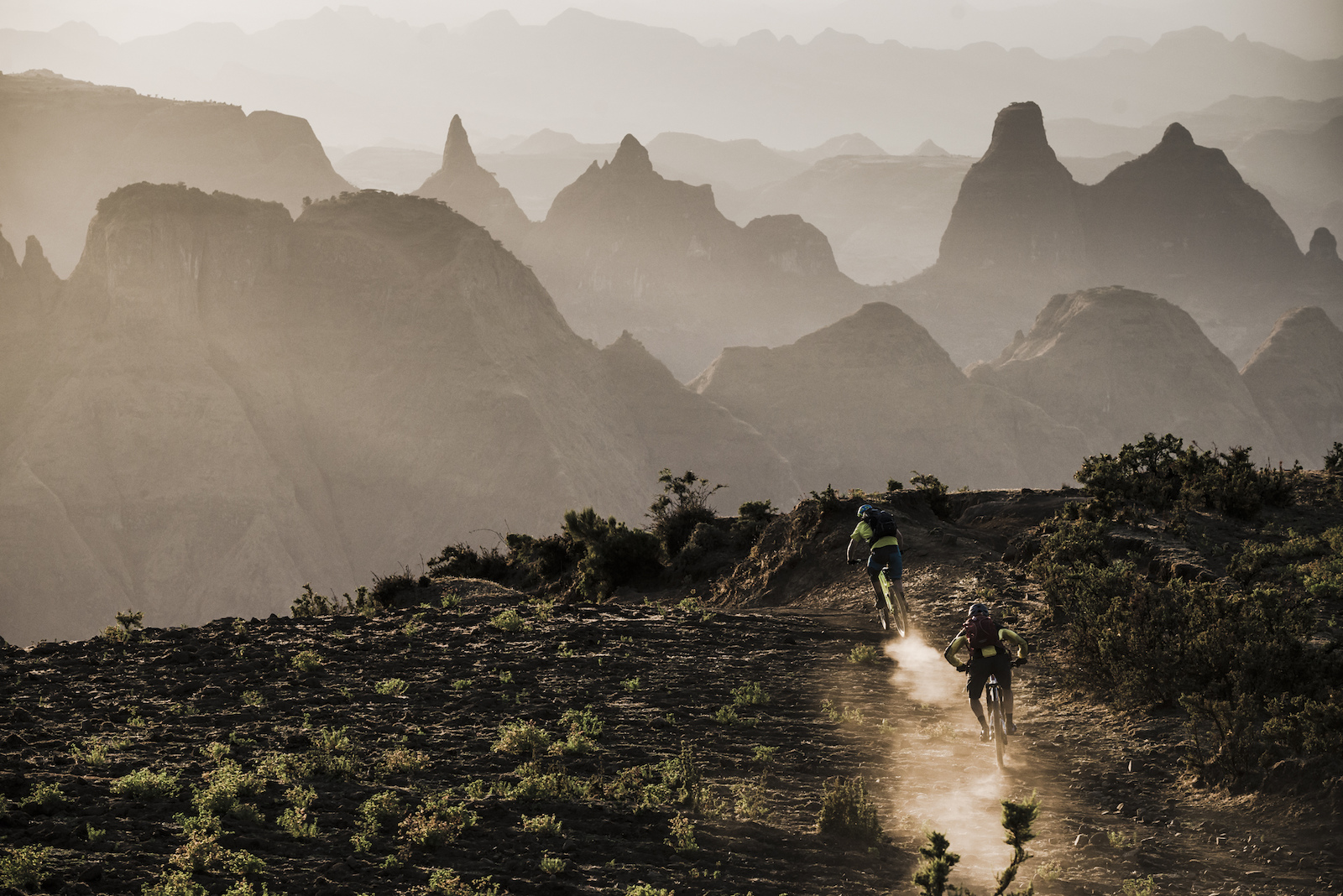
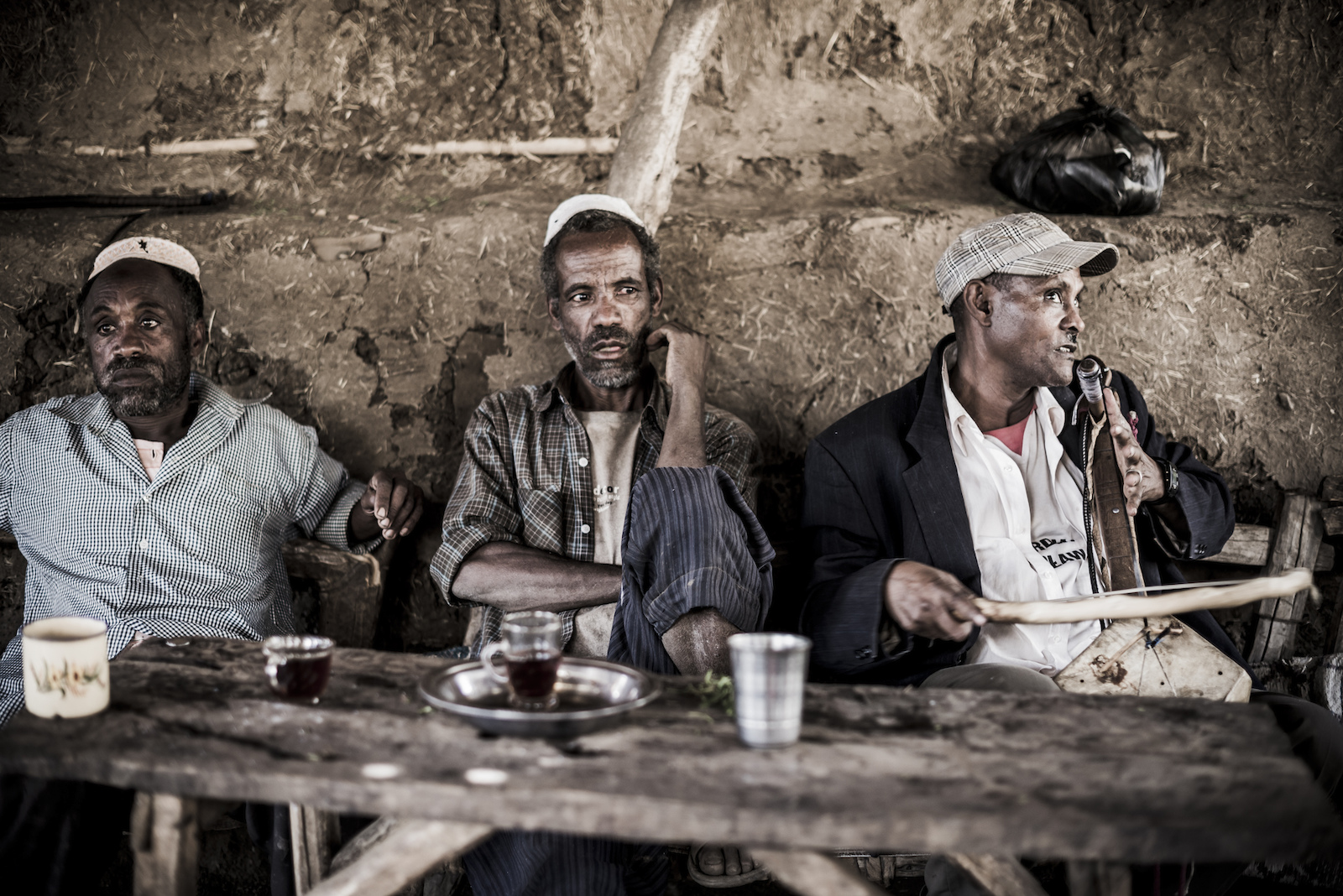
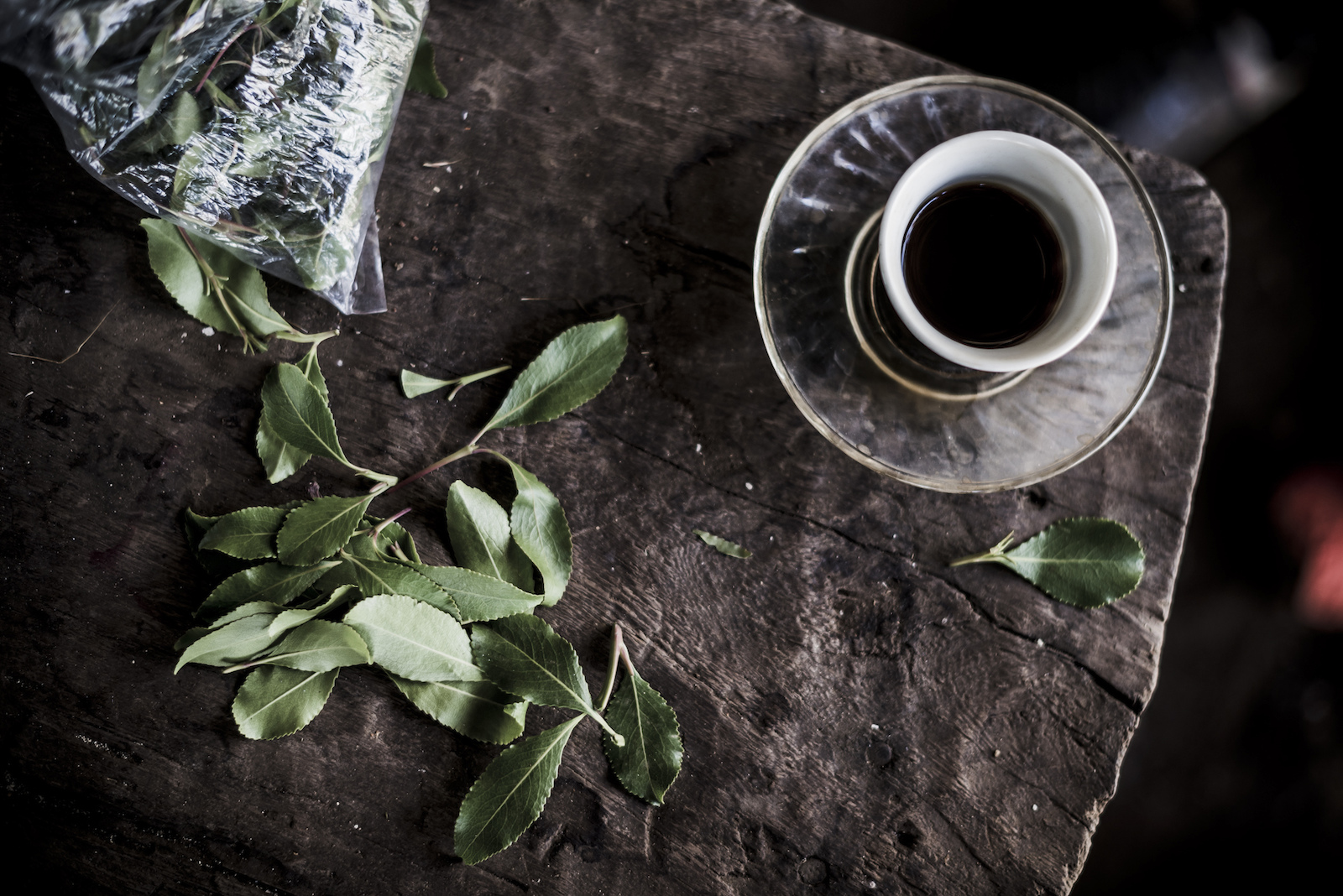
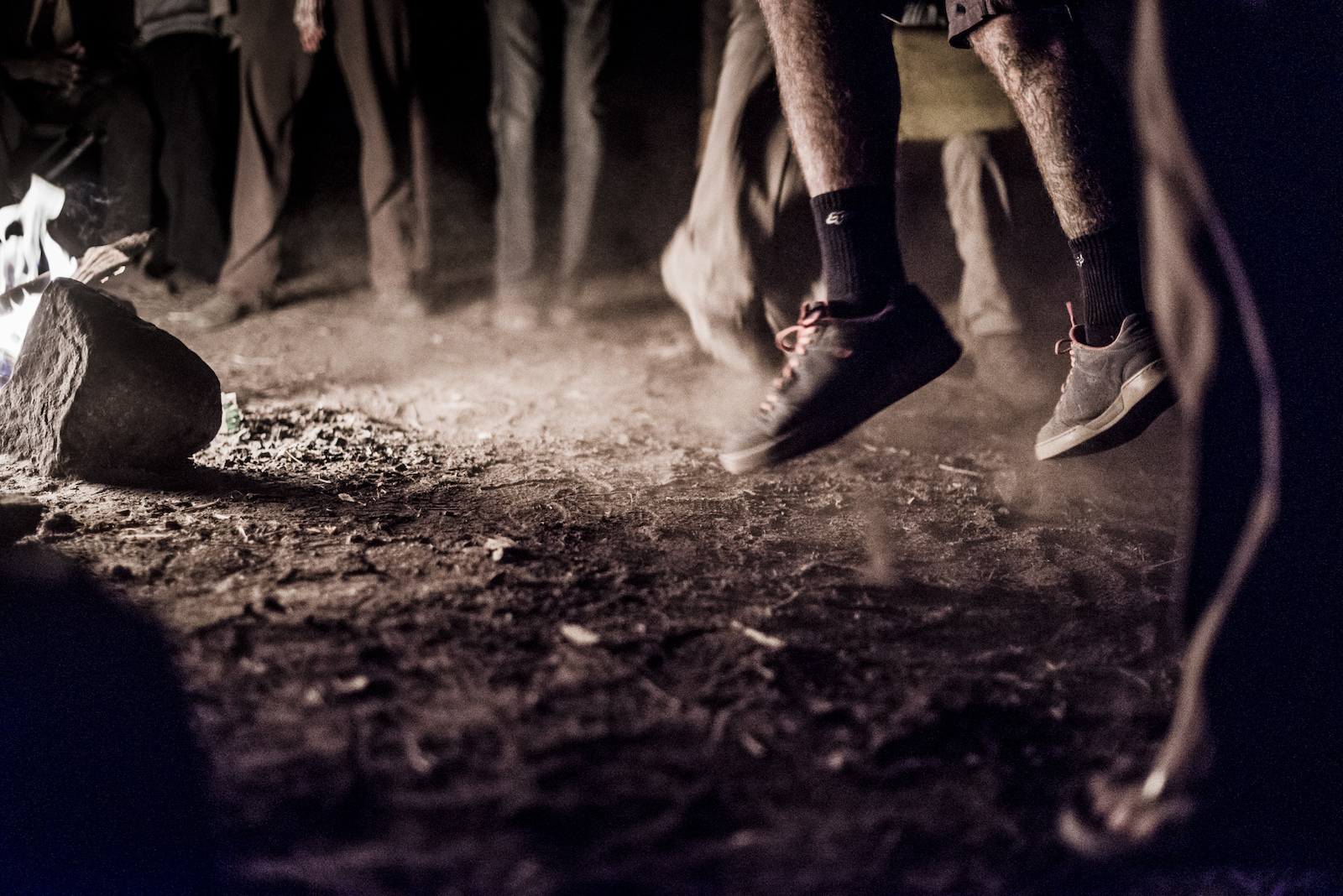
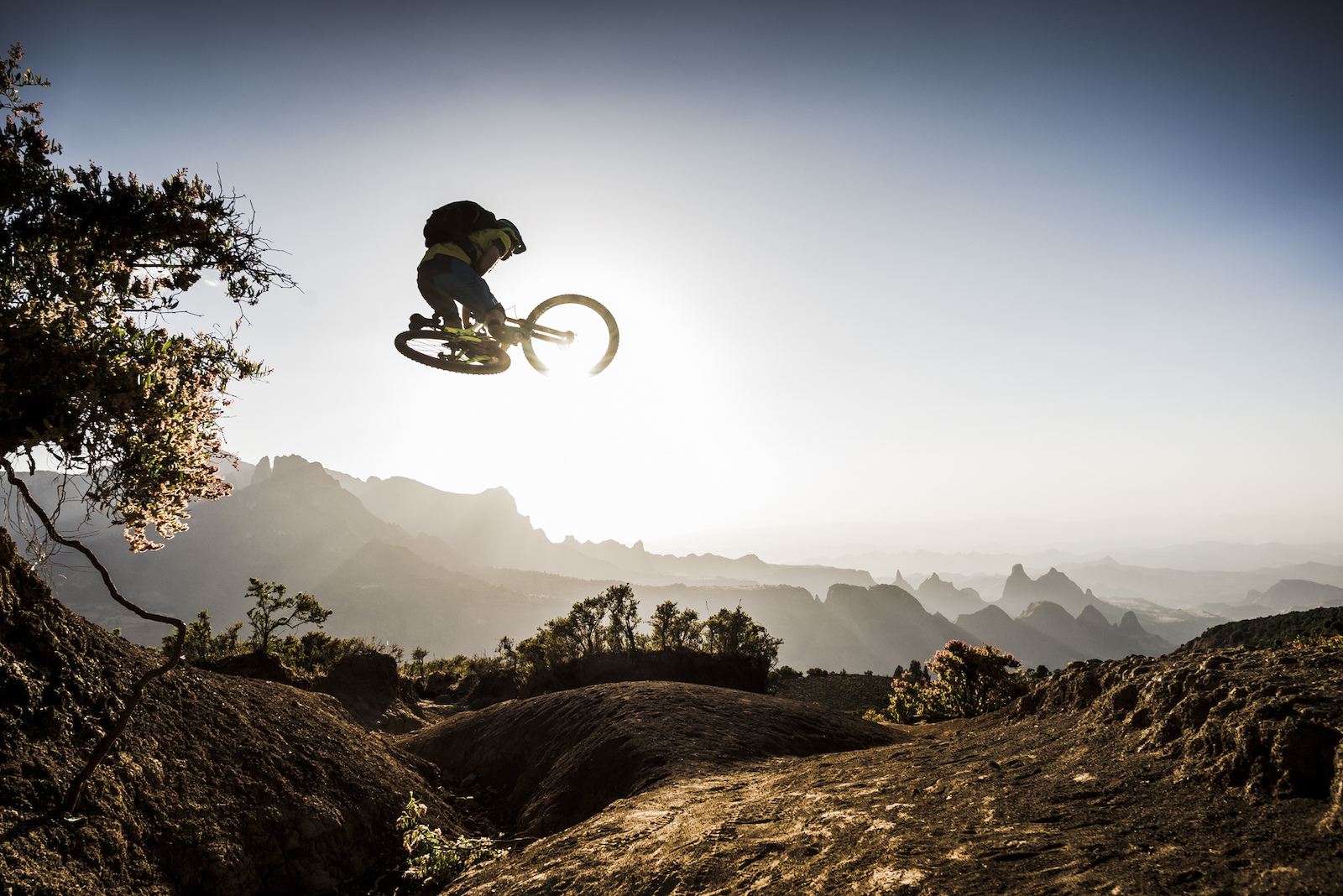

Living in Ethiopia and actually going to the Simiens I now know it is not the best place to ride in Ethiopia. No doubt for sure it was a grand adventure, but there some much better places to go on a bike in Ethiopia than the Simiens.
Another comment I have, the one hanging out with the children. My experience is that it is sometimes best to seek out your elders. They are generally respected in villages and they will make your life much easier and make sure that you are taken care of, unless of course you village elder is a lazy drunk, then you are f*cked. The look of the village can tell you about how you will be treated. And whatever you do, do not do free hand outs (money or candies or anything else), all this ever does breeds begging. Of course tipping or paying for service no matter how small is respectable.
That is my 2cents, and one other tip, if you come to Ethiopia plan a few days to ride Menagesha it is the bomb. Other places to check out Wenchi Crater and Mt. Zuqualla. My next big adventure will be either riding the Bale Plateau or follow the camel trains from Mekele down into Afar. Whatever you are thinking about just do it, whether you succeed or fail it will be an adventure.
I grew up in a poor area of the UK, and mountain biking was something I always fantasised about as a youth. I would go down the road to the local bike shop and stare at the bikes I literally dreamed of riding, but could not afford. Fortunately I live in a country with more opportunity, but at what cost? I now know in my 3rd year of environmental science the social and ecological cost of our lifestyles on both the developing and natural world.
Seeing some white westerner, adorned in fresh riding kit on a £4000+ bike being chased by a group of kids in rags in the highlands of Ethiopia is pretty disturbing tbh.
Why should I have so much when others have so little? What are the implications for developing countries people wanting to live as affluent lifestyles as ours? Clearly I'm not better than someone else because I have more money, or material things. I feel powerless and bad for being part of a society that benefits from others misfortune....
Fantastic photos @DanMilner, some of the best I've seen from Ethiopia.
Glad to see this trip report finally come out Dain. Hope your chin stitched up ok with the yarn.
Steve
Anyway, thanks for showing us around out there. I'd love to get back there someday (hopefully soon) and see your Trail 11.
Chin healed up fine, by the way!
Dain
P.S. Super cool that you can ride in the national forest there. Over here in the land of the "free" (the US), riding your mountain bike in a national park is a good way to get a big ticket or get arrested.
I'll get the Menagsesha tracks up on Trailforks at some point, but actually there are only three of us riding these trails so not a lot of demand despite the absolute world-classiness of those tracks.
Google Earth/Maps reads Menagsesha as a national forest but it actually a state forest.
I’ve travelled a fair bit with my bike and I’ve been criticised for taking my "expensive bike to a place where it could feed a family of ten for a year.” (NB: not by the people who actually live there.) Yes -it can feel bum-shiftingly uncomfortable to flaunt your fancy bike around a low-income country, however if you ask the locals, most don’t care whether you go there with a pair of flip-flops or a flashy bike. They just care that you go.
A journey like this in a remote region means hiring drivers, local guides, scouts (national park requirement) cooks, locals with mules to carry camping equipment, paying the villages to camp. It contributes to the local economy. Surely that's what feeds families? On top of that, Ethiopians told me that they’re aware of the image much of the world has about their country - an image of lands torn apart by famine and civil war that’s 30 years out of date. The bottom line is if you ask people who live in the Simiens, they want crazy mountain bikers to go on adventures there, have fun and make films about it!
Article by @GiroSportDesign www.giro.com/eu_en/ethiopia-epic sums it up perfectly. The total experience is a whole lot bigger than seeking the best trails. I also find myself still reminiscing about the journey a year later.
Here’s the not-pro less-rad more calamity version of the exped www.youtube.com/watch?v=11EMp0YmPD8 And thanks @juanmcsean - It was your film that convinced me to go in the first place.
P.S. @ken4ord @stifford I got an invite to ride those trails in Menagesha through my Facebook page. Think that must’ve been you? Next time!
Defenitely looks like a trip you'll remember for the rest of your life, probably even as a high light.
Kind of freaky though that so many people seem to have machine guns over there; must be for a reason. Also I don't think I would have the patience with all those kids running around you all day long, it would probably annoy me because I love the calm peaceful feeling of riding; where it's nothing more than just you, your bike and the trail, and nothing else in the world excists.
But it still looks like it's probably the greatest adventure you could possibly do on a bike. Even though doing it only once in your life is probably enough.
we did same route with getch 2 years ago. was great trip!
je taky parádní vidět tady Kamila Tatarkoviče v téhle roli ..super!!!!
I'd like to visit some exotic country but there's one thing I was wondering about - what about the healthcare? The room where the surgery looks worse than an average European garage, is there any health insurance plan which would, in case of an injury or sickness, cover an immediate transport to a modern 21st century hospital?
Absolutely EPIC fun, camaraderie, riding, scenery and ADVENTURE